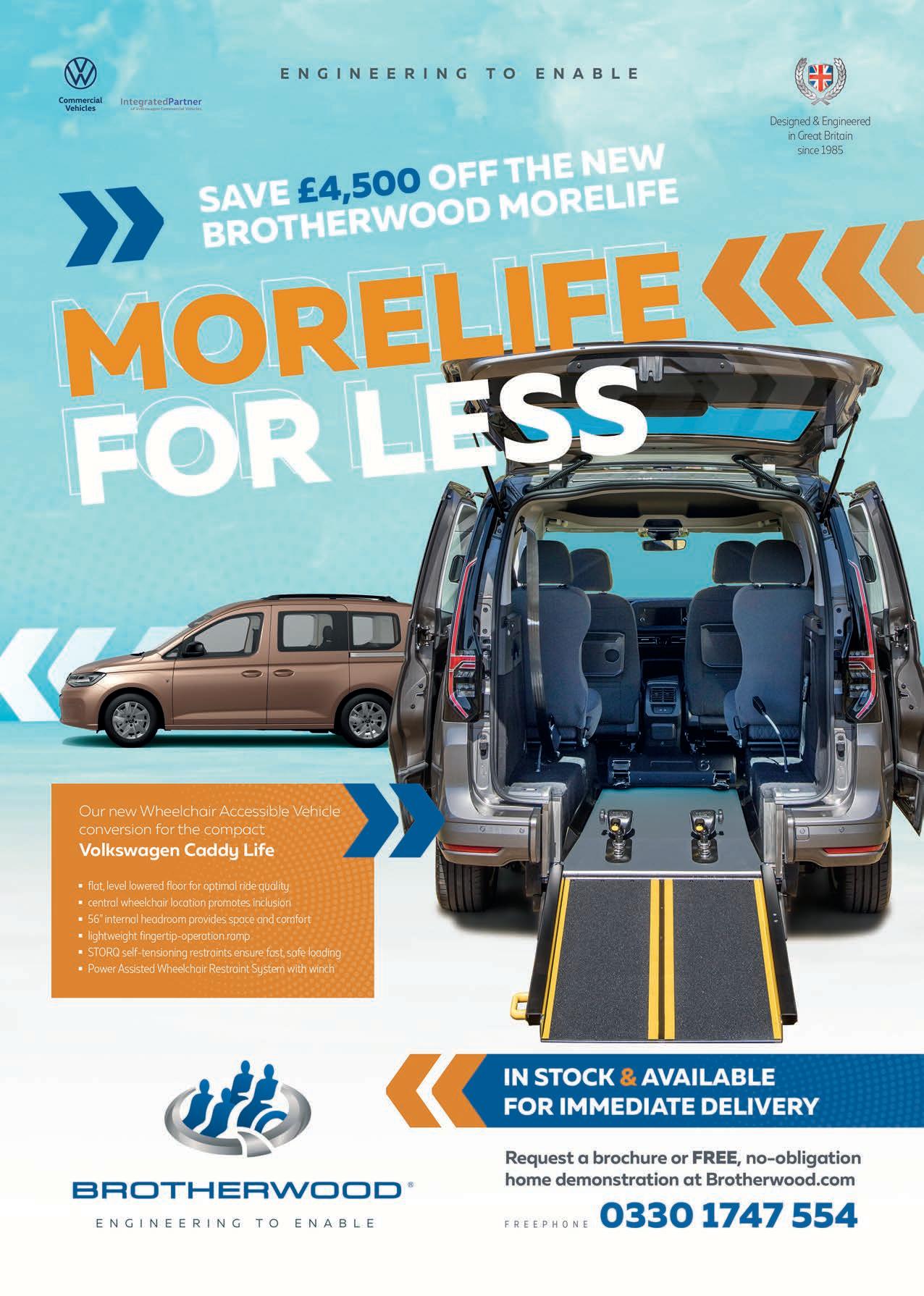




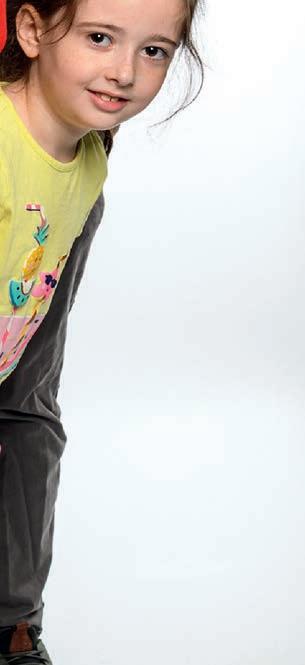
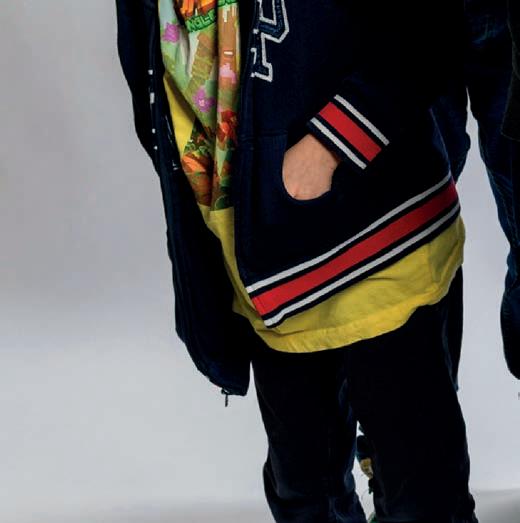



The UK’s leading disability and lifestyle magazine September / October
BLAKER
The role of sibling carers in planning ahead A PLACE TO CALL HOME Ge ing on the property ladder for less enablemagazine.co.uk The dad of six on the beauty and chaos of raising children with a SEN diagnosis Comedian
ASHLEY
TALKING ABOUT THE FUTURE































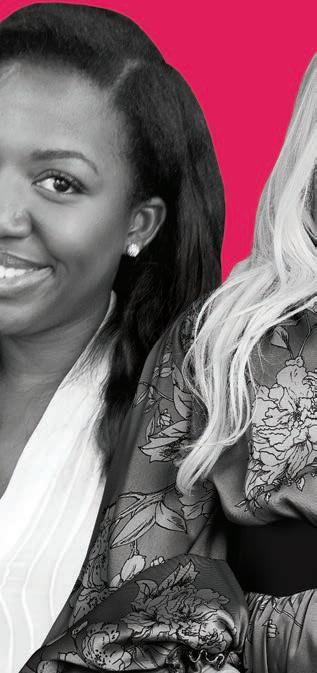

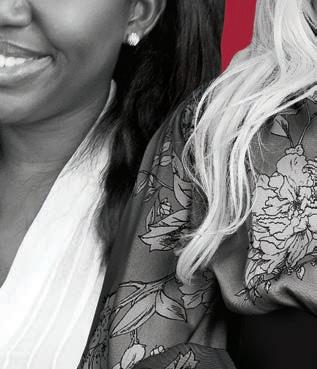





Out now Hosted by Samantha Renke & Sophie-Marie Odum plus car chat with Matt Lizzimore The life style Pod Available on all major streaming platforms with BSL and Captions Find out more
COVER PRICE £3.00



PUBLISHER


Denise Connelly denise@dcpublishing.co.uk
EDITOR
Emma Storr emma.storr@dcpublishing.co.uk

EDITORIAL CONTRIBUTORS



Jane Ha on Tim Rushby-Smith Alisdair Su ie
DESIGN AND PRODUCTION
Lucy Baillie lucy.baillie@dcpublishing.co.uk
SALES
Marian Mathieson marian.mathieson@dcpublishing.co.uk
ENABLE MAGAZINE www.enablemagazine.co.uk


DC Publishing Ltd, 198 Bath Street, Glasgow, G2 4HG Tel: 0844 249 9007

Welcome
Another informative issue of Enable Magazine has arrived
I’m not quite ready to say goodbye to summer yet, but the autumn months provide a great opportunity to cosy up and read about exciting developments and stories from the disability community. This issue, there’s plenty of engaging and informative features to delve into, starting with our lead interview with comedian and dad of six, Ashley Blaker, who has released a part guide, part memoir to parenting children with special educational needs.
As the days get shorter, there’s o en more time to relax at home. This can be a great time to get organised and plan ahead. Inside this issue, we’re helping you prepare for the future: whether it’s discussing important but daunting topics like hospice care, the role of sibling carers, and the importance of wills and trusts, or thinking about your pension and how to improve your wellbeing through more activity, the earlier these conversations are had, the be er. Luckily, we’re talking to experts and highlighting brilliant organisations that can help you get started.
I’m already thinking about what to include in the next issue of Enable and I would love your input. Let me know what you would like to see inside at the email below, and until then, enjoy the September/October issue!

EDITOR’S PICKS...
18 CALLING
Owning your home can help with adaptations, but can seem impossible. Shared Ownership could help you get on the property ladder.
Emma Storr | Editor editor@dcpublishing.co.uk

3 enablemagazine.co.uk
SUPPORT
FOR EQUITABLE
Disabled refugees and asylum seekers coming to the UK are still left with no support, we find out why.
36 A PLACE TO CALL HOME
WINNER ©DC Publishing Ltd 2023. All rights reserved. No part of this publication may be reproduced or used in any way without prior wri en permission from the publisher. The views expressed in this magazine are not necessarily those of DC Publishing Ltd. The publisher takes no responsibility for claims made by advertisers within the publication. Every effort has been made to ensure that information is accurate; while dates and prices are correct at time of going to print, DC Publishing Ltd takes no responsibility for omissions and errors.
Subscribe to Subscribe today and get the UK’s leading disability and lifestyle title delivered right to your door every two months £15 for one year £25 for two years enablemagazine.co.uk/subscribe Call 0844 249 9007 or visit: WIN An Amazon Kindle worth more than £90 on page 30 Get in touch @enablemagazine VOTED CONSUMER PUBLICATION OF THE YEAR PIC: ©
STEVE ULLATHORNE
What’s inside
Interview
8 ASHLEY BLAKER: WHAT’S NORMAL ANYWAY?
The British comedian on his new book, Normal Schmormal.

Care
10 FINDING QUALITY CARE
Understanding the range of hospice care available.
13 TALKING ABOUT THE FUTURE
We explore the role sibling carers play in planning ahead with charity Sibs.

Spotlight
18 CALLING FOR EQUITABLE SUPPORT
Health
21 EMPOWERING CHANGE
We meet the founder challenging perceptions around MS.
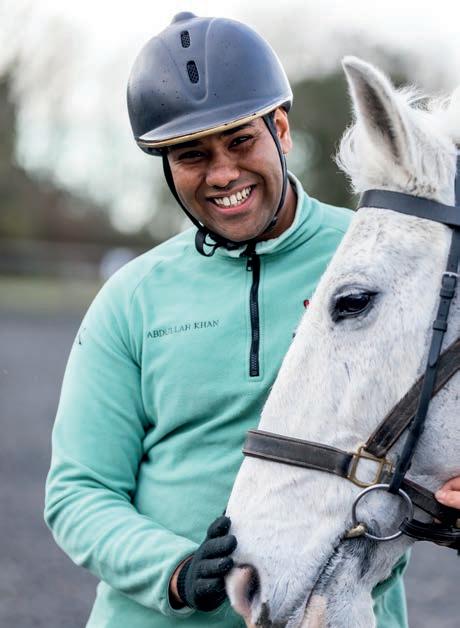
23 CREATING A BRAINSTORM
The research project using magnets to aid neurological conditions.
Voices
28 DEFINING DISABILITY
Cover story
As refugees and asylum seekers come to the UK, the support on o er for disabled people isn’t up to standard.
enablemagazine.co.uk
In the first of a two-part column, Tim Rushby-Smith explores definitions of disability around the world.
Housing
36 A PLACE TO CALL HOME
Cover story Cover story
Shared ownership could open doors to help you get on the property ladder.
Travel

47 CHANGE IN THE AIR
How air travel is improving for disabled passengers.
4 enablemagazine.co.uk
13
8
54 4
44
Life
16 CHATTING WITH TILLY ROSE
That Oxford Girl reveals her next venture and talks living with a chronic illness.
24 EMBRACING ASSISTIVE TECH
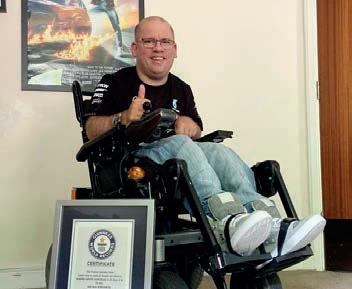
How can technology improve independence?
26 A RECORD-BREAKING CHALLENGE

Adam Stanton-Wharmby reflects on wheeling from John O’Groats to Land’s End.
33 PLANNING AHEAD
Learn about the importance of Lasting Power of A orney and wills and trusts.
39 THE POWER OF COMMUNITY
Discover grassroots projects o ering community and support.
42 RECIPE: JAMIE OLIVER’S FIVE INGREDIENTS MEDITERRANEAN
The famous chef shares his recipe for Garlic Chicken, Creamy Chickpeas, Spinach & Sumac from his new cookbook.

49 THE DIARY
What’s on this September and October?
50 PRODUCT PICKS
Our roundup of products to help you in everyday life.
Motoring
54 REVIEW: MAZDA CX-60 SUV
Alisdair Su ie takes this new car for a test drive.
Active
44 AN ACTIVE LIFESTYLE
Could you introduce more exercise into your routine this autumn?
57 CELEBRATING SPORT
Get inspired with a packed calendar of sporting events in 2023 and 2024.
Finance
53 PENSIONS: SECURING YOUR FUTURE
Discover how you can protect and build your future income.
Education
64 NAVIGATING HIGHER EDUCATION
If you have just started higher education, it’s never too late to access support.
Employment
59 EASE INTO WORK
Could an apprenticeship be the right path for you?
61 INCLUSION STARTS WITH LISTENING
A Registers of Scotland employee talks about inclusion at work.
62 TRANSFERABLE SKILLS
Jane Ha on shares advice in her latest column.
66 PROGRESSING DISABILITY INCLUSION
We meet the new chief executive of the Valuable 500.
AN AMAZON KINDLE WORTH OVER £90 ON PAGE 30

5 enablemagazine.co.uk 47
5 enablemagazine.co.uk 42 WIN
26
NHS England campaign aims to tackle life-threatening constipation
A NEW NATIONAL CAMPAIGN from the NHS has launched, helping to support people with a learning disability, healthcare professionals and carers to spot the early signs of potentially life-threatening constipation. Co-created with people with lived experience, the campaign utilises animation and posters to start conversations about constipation, ensuring people with a learning disability can receive treatment as early as possible.
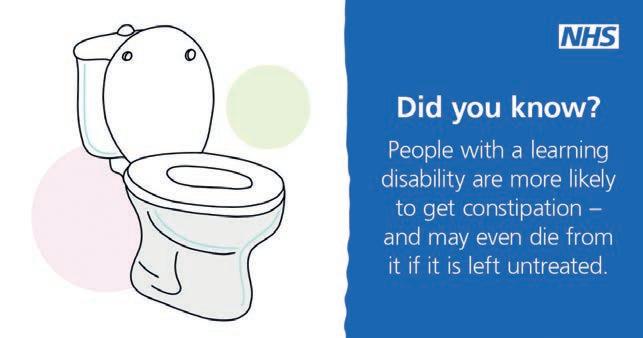
While people with a learning disability are more likely to be constipated than the general population, they are also less
likely to recognise symptoms or be able to communicate their symptoms effectively. In some cases, this can lead to serious complications and even death. Research carried out by LeDeR recently found that 50 per cent of people with a learning disability are affected by constipation, in comparison to only 10 per cent of the general population. The resources from the campaign are now available from the NHS England website (England.nhs.uk), having been developed with the Down’s Syndrome Association, Mencap and Pathways Associates.
SOUTHEASTERN MAKES ACCESSIBLE TOILETS STOMA FRIENDLY

ALL ACCESSIBLE TOILETS AT
Southeastern rail stations have been upgraded to help people change their stoma bags without hassle. The train operator serves 180 stations, running 1,700 services every day. All accessible toilets now have additional features, starting with #StomaFriendly signage on the doors to highlight the right of people living with a stoma to use the toilet.
Inside each toilet, passengers will find a hook on the door to hang clothing, bags or luggage; shelf space to ensure people have space to spread out their items and to avoid using unsanitary surfaces; a mirror to enable users to see their stoma while changing; and a disposal bin to avoid having to use a bin in public view. The changes come a er a member of
the rail provider’s Accessible Travel Advisory Panel highlighted the need for more stoma friendly facilities. Now, Colostomy UK, who helped advise on the new features, are calling for all train companies to make accessible toilets stoma friendly.
AFTER THE UNITED NATIONS published 11 recommendations for the UK Government to improve the lives of disabled people in 2016, a new report from the Equality and Human Rights Commission (EHRC) has found that there has been li le or no progress. Seven years a er the recommendations were released, the EHRC says the UK Government has made li le or no progress in some areas, leaving disabled people at increased risk of poverty, abuse and poor health. Some commitments have been made to address issues, but these have failed to go far enough. Now, the EHRC is calling on the government to make reforms including addressing problems with the welfare system; engaging with disabled people and their organisations; improving public services for disabled people.

6 enablemagazine.co.uk enable news
Report finds disabled people are repeatedly ‘failed’ by the government
News
Motabilityfrom Lookers means:
AScheme thatputs youinthedriving seat. Andeven two others.
The ever yday freedomofhaving everythingincluded. Your insurance,servicing,maintenance andfullbreakdown coverincluded.
With insurance forup to three drivers included, you don’tneedtodrive to join the Motability Schemewith Lookers.



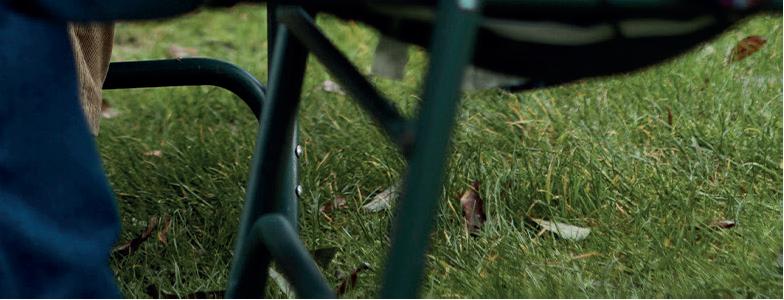



Talktoustoday
Talktoustoday

Visit: lookers.co.uk/motability
Visit: lookers.co.uk/motability
Talkto usaboutyour everydayfreedom Visit: lookers.co.uk/motability
Over 120 Dealershipsthroughout the UK and 22 Manufacturers represented we are sure to have the perfect solution for all your mobility needs.
Over 120 Dealershipsthroughout the UK and 22 Manufacturers represented we are sure to have the perfect solution for all your mobility needs.
Over 120 Dealerships throughout the UK and 22 Manufacturers represented we are sure to have the perfect solution for all your mobility needs.
The Motability Scheme is administered by Motability Operations Limited (Registered Company No. 1373876), City Gate House, 22 Southwark Bridge Road, London SE1 9HB. The facilities o ered
Lookers isregulatedbytheFinancialConductAuthority(“FCA”)andisregisteredwiththeFCAasacreditbrokerofMotability OperationsLimited,whoisthelenderinrelationtotheMotabilityContractHireScheme.TheMotabilityContractHireSchemeis administeredbyMotabilityOperationsLimited(RegisteredCompanyNo.1373876).ToqualifyyoumustbeinreceiptoftheHigherRate MobilityComponentofDisabilityLivingAllowance,theEnhancedRateMobilityComponentofPersonalIndependentPayment,theWar Pensioners’Mobilit y Supplement ortheArmedForcesIndependencePayment,which will betaken in lieuofthe four weekly rental . Prices varydepending on vehicleselected.Termsand conditionsapply.
Lookers isregulatedbytheFinancialConductAuthority(“FCA”)andisregisteredwiththeFCAasacreditbrokerofMotability OperationsLimited,whoisthelenderinrelationtotheMotabilityContractHireScheme.TheMotabilityContractHireSchemeis administeredbyMotabilityOperationsLimited(RegisteredCompanyNo.1373876).ToqualifyyoumustbeinreceiptoftheHigherRate MobilityComponentofDisabilityLivingAllowance,theEnhancedRateMobilityComponentofPersonalIndependentPayment,theWar Pensioners’Mobilit y Supplement ortheArmedForcesIndependencePayment,which will betaken in lieuofthe four weekly rental . Prices varydepending on vehicleselected.Termsand conditionsapply.
are for the hire (bailment) of goods. You will not own the vehicle. Agreement subject to acceptance and age restrictions may apply. The agreement can be terminated early with the consent of Motability Operations Limited and administrative charges may be applicable. Mileage allowance of 20,000 miles per annum over three- or five-year terms. To qualify you must be in receipt of one of, the Higher Rate Mobility Component of Disability Living Allowance (DLA), the Enhanced Rate of the Mobility Component of Personal Independence Payment (PIP), the War Pensioners’ Mobility Supplement (WPMS) or the Armed Forces Independence Payment (AFIP), which will be taken in lieu of the four weekly hire rental. Attendance Allowance is a nonqualifying allowance. Terms and conditions apply and are available on request. Lookers is a trading name of Lookers Motor Group Limited, 3 Etchells Road, West Timperley, Altrincham, WA14 5XS, registered in England & Wales Reg. No. 143470. Authorised and regulated by the Financial Conduct Authority. We are a credit broker, not a lender and can introduce you to a number of lenders. Introducing you to a number of lenders means we receive a commission. Lenders pay commission at di erent rates either as a fixed fee or as a fixed percentage of the amount you borrow. The commission that we receive does not a ect the amount that you pay to the lender under the credit agreement. Talk to us about your everyday freedom Visit: lookers.co.uk/motability We’ve got dedicated parking you can reser ve for your visit. Just let us know and we’ll save you a space right out side.
WHAT’S NORMAL ANYWAY?

When British comedian Ashley Blaker embarked on the journey of writing his debut book, Normal Schmormal, he drew from a well of personal experiences that spanned nearly two decades. Ashley, who has six children - including two sons with autism and ADHD, as well as an adopted daughter with Down’s syndrome - decided to share his unique parenting experience in a way that would resonate deeply with other parents navigating the same path, all while keeping it funny and informative.



Already armed with a BBC Radio 4 show called Ashley Blaker: 6.5 Children, the inspiration to turn his family’s experiences into a book came a er Ashley focussed an episode on raising children with special educational needs, and the response was overwhelming.
“It struck me that it would be great to run with that a bit and to turn it into a book,” enthuses Ashley.
EMBRACE
His eldest son, who is now 19, was diagnosed with autism and ADHD at the age of three, leading him to explore the resources available at the time, but the narratives o en painted a gloomy picture. This prompted Ashley to create a di erent kind of guide – one he wished he had in his hands 16 years ago.
“At the time we read a lot of books around the subject and we had a look online, it was a lot of worrying, quite depressing, scary stu , so I’ve wri en the book which I suppose I wish I’d read 16 years ago,” enthuses Ashley. “A book that definitely doesn’t hide away from any of the major challenges, I go into them at great length, and some of the more traumatic things we’ve been through, but at its heart it looks for the positive. It’s part entertaining and hopefully funny, and it’s really about embracing our children as they are.”
The book’s approach is what makes it so unique. In Normal Schmormal, Ashley seamlessly combines heartfelt anecdotes and humour with essential information and advice to provide a candid view of his family’s experiences. The book addresses the challenges head-on. Anyone who picks up a copy should prepare to laugh and possibly cry.
As for the main characters of the book, Ashley’s children, they’re excited to be involved. Proudly featuring on the cover, throughout the book readers can also find pictures of the family. Ashley acknowledges that his children are the stars of the narrative, and this focus adds a layer of authenticity that resonates with readers.
“They have di erent approaches to it, some have read every word, some aren’t that interested in it, on the radio show they all play themselves so they are very involved in that,” highlights Ashley. “They’re very aware of it and find it quite amusing seeing their faces on the cover. For me this book wouldn’t work without them, the whole thing was to really feel like you got to know us.
“I wouldn’t do it if they weren’t happy with it: it’s their story. The stars of the book are the children, not us the parents.”
GUIDE


The book is not only a heartwarming memoir but also a practical guide for parents navigating the complexities of raising children with special educational needs.
Ashley o ers valuable insights on a range of topics, from school admissions, meetings, hospital appointments and organising neurodiverse playdates, to managing dietary requirements, tackling school holidays and a ending celebrations.
Each chapter is assigned a le er from A-Z, reflecting on these di erent areas, whilst also helping readers find
Comedian and dad of six Ashley Blaker is taking a new approach in his parenting guide Normal Schmormal, making readers laugh, relate and even cry as he explores parenting children with special educational needs
enablemagazine.co.uk 8
easy-to-digest and helpful information when they need to.
“The format of the book is an A-Z, and suitably for a book about children who might find learning di cult, the chapters are all in the wrong order – it starts with N and ends with O – and it covers every le er in total,” explains Ashley. “Most of the chapters end with bullet points with a few handy things, tips and takeaways on each subject.”
One of Ashley’s favourite chapters is V is for the various times my children have humiliated me, containing five funny anecdotes and stories that will bring a smile to readers’ faces. Alongside upli ing chapters like this, at times, he had to revisit more di cult situations from their past.
“There were some bits where I had to really think back, there were things that I luckily forgot: one thing human beings are gi ed with is a lack of memory,” states Ashley. “Forgetfulness is a great gi , because we can forget negative experiences.
“There’s a chapter in the book called N is for no room at the inn, which is about our e orts to get our eldest son into school. I have forgo en all the details but luckily I kept everything: I had all the emails, all the reports, all the notes and files, so I was able to kind of go back over that stu and properly write it out.”
TERMINOLOGY
Ashley’s comedic background shines through as he intertwines wit and humour with the important topics the book covers, but through it all he has found his own way to connect with fellow parents and break down barriers that still exist for this community.
“In the book I explain that I don’t like the words ‘mainstream’, ‘disabled’, ‘normal’, what have you, so I called the children Zappas and Coldplays, so mainstream children are like Coldplay, perfectly good and what you might expect, and then the special needs children are like avant guard musicians like Frank Zappa or Captain Bee eart,” enthuses Ashley. “They just do their own thing and they don’t care what other people think.
“I love seeing that it has stuck with people, in so many reviews people will say ‘as a parent of two Zappas’, ‘as a parent to a Zappa and a Coldplay’. It’s not just a funny idea, people can actually see that and go ‘yeah that’s me’.”

The terminology was inspired by
Ashley’s own music taste.
“I was always one of those music types that didn’t want to like what other people did, I always wanted to listen to the stu that seemed too challenging for everyone else, and it’s the same with this, it’s like we’re parenting the children that might be too challenging for every other parent, we’re connoisseurs of parenting,” o ers Ashley.
Ashley’s approach has struck a chord with readers, whether they can relate to the Blaker family or not. The response to the book has been overwhelmingly positive, with readers finding solace, laughter, and understanding within its pages. With hopes of a second book in the future, Ashley is currently touring a comedy show of the same name, and about to launch the second series of his BBC Radio 4 show, except this time, raising children with special educational needs will be its full focus.
are


FOR MORE INFORMATION
Normal Schmormal by Ashley Blaker is available now. Find out more at www.ashleyblaker.com

9 enablemagazine.co.uk
enable interview
It’s really about embracing our children as they
PICS: © STEVE ULLATHORNE
Quality care

Hospice care aims to enhance the quality of life for people with terminal conditions, focusing on alleviating pain and symptoms whilst o ering emotional, psychological, and spiritual support. The philosophy of hospice care centres around a rming life and enabling individuals to spend their final days in a comfortable and supportive environment, surrounded by loved ones. The wide range of care available in hospices, at home and in the community might be more expansive than you know, and it is essential to arm yourself with this information if you are supporting a loved one at the end of life.
Hospice centres are renowned for their multidisciplinary approach, bringing together a team of professionals dedicated to caring for patients holistically. This team o en includes doctors, nurses, social workers, counsellors, chaplains, and trained volunteers.
Their combined expertise ensures that patients receive comprehensive medical care and emotional support tailored to their individual needs. Centres can provide various services, including pain and symptom management, emotional counselling and therapy, respite care, and opportunities for creative expression and relaxation to improve overall quality of life.
AT HOME
While hospice centres o er invaluable care, your loved one might want to spend their final days at home. Hospice care extends to provide support for patients and their families in domestic se ings to ensure this option is available. Hospice at home services help patients with access to trained healthcare professionals who can administer care and manage symptoms while preserving the warmth and familiarity of their home environment.
PROFESSIONALS
Hospices employ a diverse range of skilled professionals, all working collaboratively to provide the best possible care. Palliative care specialists, hospice physicians, and registered nurses are pivotal in managing patients’ medical needs. Social workers provide emotional and practical support to both patients and their families during challenging times, including grief support. Chaplains can o er spiritual guidance when asked, and counsellors lend a compassionate ear for patients or their loved ones. Alongside professionals, volunteers play a crucial role in providing companionship or assisting with day-to-day tasks, enhancing the overall experience of hospice care and removing stress from family members.
ACCESSING CARE



Access to hospice care in the UK is usually facilitated through healthcare professionals and the NHS. When an individual’s condition becomes
terminal, their healthcare team may suggest hospice care as a suitable option. Patients and their families can discuss their preferences and concerns with their doctors, who will guide them through the process and help them to decide whether this should be done in a hospice or at home. You can also contact your local hospice directly to find out about services or for an evaluation of your loved one’s needs. With a focus on holistic wellbeing, hospice care centres and home-based services provide compassionate support to patients and their families when they need it most.
FOR MORE INFORMATION
For those seeking more information about hospice care and services available in their region, Hospice UK is an invaluable resource. The organisation’s website (www.hospiceuk.org) offers a wealth of information about hospice care, its benefits, and guidance on accessing appropriate services.





10 enablemagazine.co.uk FINDING
Hospice care plays a pivotal role in ensuring comfort and dignity at the end of life, and more support may be available than you realise
care
enable
Regain control over your bowel
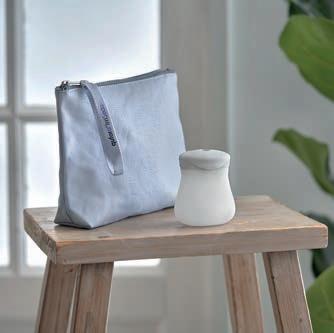

Su ering from bowel issues, such as faecal incontinence or frequent toilet visits, are common and have a disrupting impact on your life.
Qufora IrriSedo MiniGo is a bowel irrigation system that is an e ective way to regain control over your bowel and lets you get on with leading your life, your way.



Contact our support team to find out how Qufora IrriSedo MiniGo can help you and work along side your other bowel treatments and routines.

➔ Simple to fill
➔ Easy grip
Healthcare Ltd
➔ Discreet non-medical design MacGregor
Qufora® is a registered trademark of Qufora A/S. ©10/2020. All rights reserved Qufora A/S, 3450 Allerød, Denmark. *Qufora IrriSedo MiniGo evaluation 2021.
www.myqufora.com
for you
of experts
it’s easy to use
Tel: 0800 612 9080 Email: advice@myqufora.com
Designed
97%*
agree

TALKING ABOUT THE FUTURE
When we talk about caring for a disabled child, the spotlight o en falls upon parents and professional caregivers, while the vital role that siblings play in supporting their disabled brothers and sisters can sometimes go unnoticed. Sibling carers can play a vital role in future care, but this has to start with an open conversation

13 enablemagazine.co.uk
enable care
Siblings o en embark on a lifelong role of caring that can be extremely demanding. As parents age and considerations about future care arise, brothers and sisters could find themselves facing a unique set of challenges and responsibilities to consider.
RESPONSIBILITY
From a young age, siblings of disabled people assume an extraordinary level of responsibility, one that extends beyond familial duties. Thoughts about what will happen in the future when their parents are gone are nothing new: they might be something that has always been there. This can shape how siblings build their own lives as they get older, always taking their sibling’s needs into account.
“This is something that has been on their radar since they were children, since they were teenagers, since they first le home because it has always been there, it has always been a topic for sibling carers,” explains Frances Danylec, development o cer for adult siblings at Sibs, a UK-based charity for siblings of people with lifelong disabilities. “For anyone else it’s a discussion that they will come across later in life, but for sibling carers it’s something they never stop thinking of.”
Tackling this topic o en comes in two stages: the first aspect involves contemplating the future when parents are no longer there to provide care. Broaching this topic can come
with a rush of questions, from the financial implications to the nature of care required.
“A lot of siblings have worries around finances and who will look a er their brother or sister: what kind of care will they need? Where will they receive this care from? What will happen with hospital appointments and visits, and who will take them?” asks Frances. “It really varies depending on the disabled person’s needs, but there’s a lot to consider and a lot of worries. It’s like thinking for two.”
GROUNDWORK
One critical piece of advice Frances imparts is to start the conversation early. Making concrete plans for the future might not be feasible, but laying the groundwork by discussing potential scenarios can alleviate worries down the line. Open communication and gradual preparation are key.
“Some parents work well with the kind of li le and o en approach,” o ers Frances. “Others cope be er if you sit them down and say ‘we need to talk about this and we need to set aside some time to make decisions’.”
Navigating these conversations can vary based on family dynamics. Regardless of the approach, acknowledging the complexity of the situation is essential.
“It won’t all get sorted in one conversation, there’s too much to talk about, but it’s important for siblings, for their own mental and emotional health, that they have their worries shared,” emphasises Frances.
Equipping siblings with resources is another pivotal aspect of this journey. The Challenging Behaviour Foundation and Sibs both o er guides for planning future care. Frances also suggests joining support groups, o en found on social media
sites like Facebook, to connect with people who have similar experiences and can provide practical insights.
RECOGNITION
A key step to accessing advice and support through this process is identifying as a carer, something that many siblings may not label themselves as.
“One of the things we struggle with at Sibs is helping siblings to selfidentify as carers,” acknowledges Frances. “So many of them will say ‘but my mum or dad is the carer for my brother, I just pop round and help with this or that’.
“Think about what you do for your brother or sister that you wouldn’t do for another person of the same age without a disability. If you took the disability away you wouldn’t be ringing you brother five times a day to provide emotional support. You wouldn’t need to help someone understand their bills or their money.”
Recognising this caring role opens up doors to vital resources, such as carers assessments and allowances, workplace rights, and protection against discrimination.
Identifying yourself as a carer can aid in planning for the future, but it is also crucial to dispel misconceptions.
“Siblings have no legal obligation to provide care for their disabled brother or sister,” clarifies Frances. “They’ve got no legal right to make decisions on behalf of their brother or sister, and they shouldn’t be asked to contribute financially, that’s a common misconception with siblings.”
As sibling carers think about the future and have conversations about what happens next, prioritising their wellbeing is essential.
“You do have to put yourself first, you have to put your own oxygen mask on first, otherwise, you just get burnt out,” advises Frances.
Whether you are just starting this conversation, or plans are already in place for your sibling’s future support, take it one step at a time and remember that decisions on how this will a ect your life in the future should be made by you.

FOR MORE INFORMATION
Gain support and information for sibling carers of people with lifelong disabilities from Sibs (www.sibs.org.uk).
14 enablemagazine.co.uk
enable care
There’s a lot to consider and a lot of worries. It’s like thinking for two

















In conversation with TILLY ROSE
Author and patient advocate Tilly Rose has lived with a chronic illness most of her life. By sharing her own story, she is helping other people have their voices heard

For years, Tilly Rose’s life has been intertwined with chronic illness, but despite any challenges, she has gone on to study at Oxford University and created multiple online communities. Now, she’s ready to launch her next venture.
DETERMINATION
Tilly’s fight for a diagnosis began at an early age, as she grappled with symptoms of a chronic condition that disrupted her everyday life. Through repeated bouts of pneumonia and emergency hospitalisations, Tilly persevered with a dream she had since she was a child: a ending Oxford University.
“My health constantly disrupted my schooling but I was really focussed and I knew I wanted to go to university, and amazingly I went on to go to Jesus College where I studied English,” remembers Tilly.
During her time at Oxford, Tilly finally received a diagnosis: she had been living with undiagnosed active tuberculosis for 13 years. Despite finally ge ing answers, Tilly decided that she didn’t want to tell her peers straight away.
“I hated the idea of having the label of being ‘sick’ rather than just being known as myself,” Tilly reveals.
She embarked on her mission to be perceived like everybody else, but a er receiving a secondary diagnosis of Addison’s disease in 2018, Tilly faced new challenges and decided to share her story.
THAT OXFORD GIRL
Before sharing her experiences as a patient online, Tilly took a new trajectory with the launch of That Oxford Girl: a platform o ering free resources for students navigating the challenging university application process.
“When I was applying to Oxford, I felt
that there was nothing free out there that provided access to help,” explains Tilly.
As these platforms continued to grow, the world grappled with the coronavirus pandemic. At this time, Tilly began sharing her journey of living with a chronic illness and coping with isolation on Instagram. Then, last summer, she spent almost three months in hospital. When the doctors were struggling to diagnose her, she turned to the Instagram community.
“I decided I had nothing to lose by sharing my experience and symptoms online,” recalls Tilly.
The response was astounding, everyone from medical professionals to fellow patients reached out with insights and encouragement. Tilly quickly discovered a community of people who could relate and empathise with her, and her openness fostered a sense of validation: she wasn’t alone in her experiences as a patient.
Since then, both Tilly’s personal page and That Oxford Girl have grown substantially: she has more than 49,000 followers, and That Oxford Girl has more than 44,000, more than 100 contributors, and Tilly has wri en a book of the same name to help young people who are applying to Oxford University.

THAT PATIENT COLLECTIVE
Now, Tilly is taking her decades of experience as a patient and ensuring everyone feels like their voice is heard. During September 2023, Tilly is launching That Patient Collective: a space where people living with chronic illness can share their stories, find solace in shared experiences, and advocate for improved patient care.
“It’s about giving patients a voice,” states Tilly.

When asked about her advice for other people living with a chronic illness, Tilly emphasises the importance of research and fighting for answers whilst continuing to live your life as much as you can.
“You have to adapt and find new ways of doing things, but it doesn’t mean things that you could do in the past are now impossible,” highlights Tilly. “Remember, if you’re undiagnosed and struggling to find an answer, it doesn’t mean that there isn’t one out there, keep pushing and advocate for yourself.”
FOR MORE INFORMATION
Keep up with Tilly on Instagram @tha illyrose and @thatoxfordgirl, and discover more about That Patient Collective @thatpatientcollective and www.thatpatientcollective.com
16 enablemagazine.co.uk
enable life
Tilly Rose
We all welcome a little extra assistance now and again, particularly when travelling alone. Thistle Assistance is an initiative to help you feel safer and more comfortable when using public transport.
thistleassistance.com
CALLING FOR EQUITABLE SUPPORT
The journey to safety and stability is filled with challenges for asylum seekers and refugees coming to the UK, particularly for disabled people in this situation. Support is necessary to help them navigate the UK’s intricate policies, however, the reality falls short of the legal duty to provide disability support. Delays in assessments have le disabled asylum seekers without the assistance they desperately need.
Shelley Braddock-Overbury, a senior caseworker at Refugee, Asylum seeker and Migrant Action (RAMA), underscores the significance of appropriate support, building relationships and connecting communities rather than keeping people isolated.

INTEGRATION
The people RAMA work with come from more than 100 countries, and in an e ort to combat the complexities this can bring, the charity runs di erent projects to help people build connections.
“We really strongly believe in building relationships and communities rather than sort of keeping people separated from society and having them in an isolated se ing,” emphasises Shelley. “Support is so important because there’s a big transition for asylum seekers and refugees when they come to the UK.
“It’s really di cult for them to navigate their way through our systems without support, so we just feel we fill that gap and we also feel it’s important around community building
so as not to create a division of us and them, but to all learn to live together and take advantage of the culture and integration that brings.”
DUTY
Navigating unfamiliar systems and adapting to a new environment can be daunting, especially for disabled people, and this is where organisations like RAMA play a pivotal role. Over the last year, the team at RAMA has had a focus on supporting disabled asylum seekers who o en face unique challenges. Despite a legal duty to provide disability support, the reality is starkly di erent.
“By law, there is a duty to provide disability support for anybody regardless of their immigration status, but yet the assessments are not forthcoming,” explains Shelley. “What we’re finding is when we go and work within those se ings as part of our outreach team, we’re having to really push and advocate to get those assessments done which takes months of really hard work. In the meantime, those asylum seekers are going without essential support.”
If this legal duty is unfulfilled, then disabled asylum seekers are le grappling with months of uncertainty without vital support. It’s not just about physical care, but also equipment.
“People are going without wheelchairs, without white canes if they are blind, without proper beds or mobility equipment,” reveals Shelley.
The consequences of these systemic shortcomings are devastating and the absence of basic necessities creates a domino e ect, limiting individuals’
18 enablemagazine.co.uk
People are going without wheelchairs, without white canes if they are blind
The support, or lack thereof, that disabled refugees and asylum seekers experience during their transition to life in the UK is a critical issue that needs a ention
potential contributions to their new communities. Additional challenges can arise when people are placed in accommodation.
“O en when people are placed in accommodation, the sta there are not trained because it’s not a care home, they don’t know how to provide suitable care or assessments or how to get other organisations involved,” shares Shelley. “It’s not what they do and it’s also not what they are paid to do, so from the start people are being placed somewhere that isn’t appropriate for them.
“Because of their extra needs and disability, there seems to be this very grey area and nobody seems to be taking responsibility.”
ADVOCACY
Advocacy plays a pivotal role in ensuring that necessary services are delivered, and RAMA is educating
clients about their rights, empowering them to access legal advice and take action when necessary.
“A really important part of our role has been advocacy, really pushing for these assessments to happen because otherwise these people are just literally le with nothing,” highlights Shelley.
While the overall situation for disabled asylum seekers is concerning, Shelley maintains a hopeful perspective, she says: “If we don’t have hope then things will never improve. I think we need to keep pushing, laws are made to be upheld so I think it’s just a case of them being pushed to do so.”
The daunting scale of the issue is a barrier to ensuring everyone has support.
“We are obviously just a small organisation in one part of the country and we’re aware that there are very vulnerable people throughout the UK,”
o ers Shelley. “There will always be people that slip through the net if the Home O ce isn’t being pushed to give the right support, so that is an ongoing concern.
“We’re always happy to take a call or an e-mail and if they’re within our area we can assist, if they’re not within our area then we will make sure we find somebody that is more local to them who can o er help.”
The stories of disabled refugees and asylum seekers arriving in the UK reveals a system that isn’t providing the necessary support, and serious change is needed now.
FOR MORE INFORMATION
If you need to access support, or you would like to learn more on this topic, speak to RAMA (www.rama.org.uk), Asylum Welcome (www.asylum-welcome.org), or Refugee Action (www.refugee-action.org.uk)

19 enablemagazine.co.uk
enable spotlight
HelpingtoPreventPressureUlcers

Whatisapressuresore?
Anareaofskinandunderlying�ssuethatgetsdamagedby unrelievedpressure.
Pressureulcerisusuallycausedbytoomuchpressureon theskina�ernotmovingforlongperiodsof�me.Body weightpressedagainstahardservicecandamagethe bloodsupplytotheskin.Draggingorslidingyourskin acrossaserviceisknownasshearing,anddeeperlayersof skincanthenbedamaged.









ProbableCauses
Preven�on


HowcanCentrobedhelp?
•Regularre-posi�oning
•CosttheNHSmorethan 3.8millioneveryday
•180,000newpa�entswithpressure soreseveryyear
•Over700,000pa�entsareaffected
•Highriskpa�entsarepeople over70orpeopleconfinedto abedforlongperiodsof�me
•Lackofmobility
•Lackoffluid(dehydra�on)
•Moistskin






•Slidingdownthebed (Shearing)
•Weightloss
•Poordiet
•Fric�onorrubbing

•Othermedicalcondi�onssuch asdiabetes
PressureAreas

•Regularinspec�onand monitoring
•Keeppa�entmoving
•Educateclientandcarer

•Awarenesstoall
•Correctproductsand equipmentatthecorrect�me
•Availabilityofstaff,product andequipment
•Correctproductsand equipmentatthecorrect �me
•Keeppa�entmoving
•Availabilityofproducts andequipment
•CostSavingequipment


•Op�ontohire
CentrobedTurningBeds





lives.Previouslyweweregettingupmultipletimesduring thenighttore-positionhim,andthatwasseverely impactingbothhisandourwellbeing.Fromthefirsttime hesleptintheCaribbean,hesleptallnightwithno requeststobemoved,andhascontinuedtodoso.
It'sgivenhimsomeindependencebackintermsofbeing abletomanuallyre-positionhimselfbyusingthehandheld controls,aswellaspeaceforusatnightaswe'reableto pre-settheautomaticturningfunctionatbedtime.
Yourkindnessandunderstandingreallywasappreciatedaswellasyourpatienceaswewentthoughthefunding processforthisessentialpieceofequipmentforourson.I haverecommendedyou(andthebed)toallthefamiliesI knowwhohaveachildwithasimilarcondition.
PatientB
Patientwasplussize,ittook14agencystaff(nurses&carers)to turnthepatient4timesaday.AftertriallingTungstenthebedwas purchased.Thebedrepositionedwithoutalmostallofthestaff. Bringingabetterqualityoflifeforthepatient.
Centrobed‘sturningbedcouldsaveinexcessof£40,000 ayearbyreducingnightcarersandre-posi�oning withoutinterven�on.
1 2 3 4 7 5
Availabletodownloadonwww.centrobed.com
TungstenElite80Stone TurningBed
ArcticTurningBed
CostSavingSolu�ons
Fact 6
TurningBed 4 7 7 2 2 1 3 6
CaribbeanChildren's
Empowering change
It is estimated that there are over 130,000 people living with multiple sclerosis (MS) in the UK, but o en, the black MS community is forgo en. With her initiative, The Nerve of My MS, Natalie Diana Busari is influencing change


The general public o en remain oblivious to the challenges faced by people living with non-visible illnesses and disabilities, but for the black community, these experiences are also shrouded by cultural barriers, and be er awareness and support is needed. Through her digital platform, The Nerve of My MS, Natalie, who lives with the condition, is advocating for her community and challenging misconceptions.
SIGNS
Before being diagnosed with MS, Natalie started to notice subtle signs: fingers that wouldn’t obey her, strange
visual disturbances, and unexplainable fatigue.



“I would wake up nearly every morning, and two of my fingers on my right hand would be down,” Natalie recalls. “It happened every morning, but I just put it down to sleeping on my hand the wrong way.”
As these signs persisted, Natalie decided to consult a GP. Her path towards a diagnosis of MS started, but it was marked with years of confusion and uncertainty, then eventually a firm diagnosis and acceptance.
creating a safe space for people to share their stories authentically. Through The Nerve of My MS, Natalie addresses the multifaceted nature of living with MS, she emphasises the need for inclusivity within the MS community and discusses the unique challenges faced by people of colour.
“We deal with cultural issues, we deal with discrimination within the healthcare system,” emphasises Natalie. “I know that people need help.”
remembers Natalie. “When
“For a long time, I didn’t want to admit I had MS and thought it must be something else that had a solution, but then I kind of changed my mindset,” remembers Natalie. “When I was pregnant with my second child I decided I wanted to embrace it and start understanding the condition,” reflects Natalie.
NEW CHAPTER
The diagnosis wasn’t the end, it was the beginning of a new chapter. Natalie’s determination to shed light on the experiences of the black MS community led her to starting The Nerve of My MS.
“I wanted to show the good, the bad, the ugly of living with MS, something that hasn’t been done before,” she explains.
Her social media presence rapidly transformed into a movement online,
Her initiative addresses these concerns and provides a platform for people to share their experiences, and the response has proved its importance. From celebrities like Selma Blair reaching out, to nominations for diversity awards, the impact continues to grow. The initiative is about resilience, advocacy, and hope, and highlights the importance of building an environment where people a ected by MS can find support, understanding, and resources.
As Natalie and her team grow the platform and advocate for support, they are tackling issues that are o en ignored and paving the way for a more equitable MS community.
FOR MORE INFORMATION
Learn more about The Nerve of My MS online (www.thenerveofmyms.org.uk) and on Instagram (@thenerveofmymultiplesclerosis).
21 enablemagazine.co.uk
enable health
Natalie Diana Busari



































































































CREATING A Brainstorm
Researchers from the University of Glasgow are working with colleagues from Germany, Italy, Spain and Finland on a new brain stimulation project, with the aim to treat a widerange of neurological disorders in the future.
DEVELOP
The Wireless Deep Brain Stimulation Through Engineered Multifunctional Nanomaterials project, nicknamed BRAINSTORM, aims to treat conditions like depression, panic a acks, epilepsy, Alzheimer’s disease and Parkinson’s disease by developing tiny injectable magnets. It is hoped that these magnets could be used to restore function to damaged neurons in patients’ brains.
The nanoscale magnets the team are developing would use neurostimulation: a practice which uses electrical currents or magnetic fields to control the activity of nerves or neural circuits. This practice is already used in the treatment of di erent brain-related conditions,
and o en sees surgeons implant electrodes in to patients’ brains to deliver treatment.
Over the next four years, the researchers will work to develop their technology, hoping to deliver improved results with less invasive techniques. Once developed, the nanoscale magnets will be tested in a preclinical study with rodents, using external magnets to deliver stimulation to specific neurons in their brains.
BREAKTHROUGHS
If successful, BRAINSTORM could be a breakthrough in treatment for neurological disorders, and has been made possible due to £2.57 million in funding from the European Innovation Council’s Pathfinder programme. The programme exists to provide funding for researchers who are developing emerging technologies.

The team at the University of Glasgow will be led by Professor of Nanoelectronics, Hadi Heidari, and will develop a wearable helmet-like device to help control the magnets
once they are injected into patients’ bloodstreams.
“Our present methods of delivering neuromodulation can require invasive surgeries to implant electrodes, which can be expensive, painful and expose patients to an increased risk of infection,” explains Professor Heidari. “BRAINSTORM is an exciting new opportunity to rethink how wireless neuromodulation is delivered. It builds on recent advances in magnetic coil nanofabrication, materials science and medicine to allow us to find new ways to precisely ‘switch on’ or ‘switch o ’ neuronal activity for therapeutic e ects.”
As the project launches, it marks an exciting time for neurological research, adding to recent developments in treatments.
FOR MORE INFORMATION
Discover more about BRAINSTORM and keep up to date with the project at www.brainstorm-project.eu
23 enablemagazine.co.uk
A new research project is aiming to develop a revolutionary method of treatment for a range of neurological disorders
enable health
Embracing ASSISTIVE TECHNOLOGY
In the digital era, assistive technology is constantly developing, helping to improve people’s quality of life by increasing independence. Products can be wide-ranging, from simple devices like automatic pill dispensers and easy-to-use alarm clocks, to everyday devices that many people own like smart speakers and smart thermostats, through to complex devices like glucose monitors that connect to your smartphone. There is now an assistive technology device to help everyone, and they can help in every se ing from in the home or out and about, to at work or in education.
Providing someone with assistive technology, or seeking it out for yourself, can create a positive di erence to their daily routine, simplifying processes that have become di cult or hard

to manage. For people who are blind or visually impaired, the technology available is always improving, whether this is physical devices, signage or so ware.
When you are out of the home using transport or doing your weekly shop, NaviLens (www.navilens.com) technology is becoming a popular way to empower people who are visually impaired. This can be especially helpful for people who have di culty using traditional signage, making unfamiliar environments more appealing and safer. The technology uses codes that can be scanned with a mobile phone camera to get necessary information. The signs are now used in cities around the world to make public transport more accessible, and on individual items in supermarkets to make them easier to find, or to o er essential information about products.
SIGHT AND SOUND
Ensuring people have the tools they need to live life to the maximum, Sight and Sound Technology is the UK and Ireland’s leading supplier of hardware and so ware to people who are blind or visually impaired, and people with learning and reading di culties. Working with individuals, charitable organisations, businesses and educational establishments, Sight and Sound’s product solutions have been specifically designed to improve quality of life at work, during study, or in the home. The company o ers a widerange of products, from screen readers, mobile phones and braille embossers, to video magnifiers, calculators and keyboards. Alongside this helpful range, Sight and Sound o ers lifetime telephone support and technical support over email to ensure users get the most out of their products. Discover the full product range and learn about Sight and Sound’s services at www.sightandsound.co.uk
FOR MORE INFORMATION
Disabled people’s organisations like Scope (www.scope.org.uk) and Business Disability Forum (www.businessdisabilityforum.org.uk) can offer information on assistive technology for the home and for work.
24 enablemagazine.co.uk
enable life
Whether it is a simple device to help around the home, or something specific to a disability or impairment. The market is packed with assistive technology to improve independence and make everyday tasks easier
The UK’s leading provider Hardware and Software Solutions for the Blind, Visually Impaired, and People with Learning, Reading, and Writing Difficulties. Our products can improve your quality of life at Work, at Study, or at Home.



Unlike all other devices which require word-by-word scanning Laser
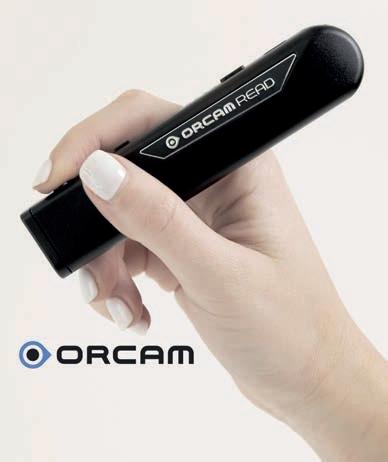

The device’s precise laser targeting captures & reads any text you choose
For People with Mild Vision Loss and Reading Difficulties including Fatigue



OrCam READ Smart Online Call www.sightandsound.co.uk 0800 085 6055 Contact us for for more information or to book a demo Discover the ultimate way to read any printed or digital text, anytime, anywhere! Enjoy your morning paper, dive into your favourite book, and boost your work productivity easily and effectively by scanning smartphone or computer screens. OrCam Read uses cutting-edge AI technology,
for all ages, it is ideal for anyone who
it
to readng text.
Difficulties
Fatigue OrCam READ Smart RRP £1,795 FREE HOME DEMO We can conduct in-person or virtual demos for all of our products, in the comfort of your own home! Sign-up for news and offers on our website
designed
needs assistance when
comes
For People with Mild Vision Loss and Reading
including
Difficulties.
Study, or at Home. OrCam READ Smart Online Call www.sightandsound.co.uk 0800 085 6055 Contact us for for more information or to book a demo
The UK’s leading provider of Hardware and Software Solutions for the Blind, Visually Impaired, and People with Learning, Reading, and Writing
Our products can improve your quality of life at Work, at
OrCam READ Smart New! Smart Reading
Request text of interest, and the relevant information is read to you
Full Page Capture
Guidance
A RECORDBREAKING CHALLENGE


Adam Stanton-Wharmby is no stranger to a challenge: since 2017 he has been raising money by completing challenges in his wheelchair, increasing awareness of the barriers that wheelchair users face

During April 2023, Adam set out to complete his latest challenge, going from John O’Groats to Land’s End in a powered wheelchair. This challenge was di erent than the rest: not only was it his biggest yet, but he also wanted to break the Guinness World Record whilst raising money for Whizz Kidz.

PREPARATION
The process of preparing for the challenge, which Adam has dubbed JOGLE, started when Formula 1 charity Grid4Good got in touch, with the Mercedes Formula 1 team o ering to develop a modified wheelchair that would help Adam complete the route.
“They sat down with me and said ‘what are your wants and needs?’,” recalls Adam. “They took 70kg out of it, making it lighter and be er to drive and did some other work on it.”
The wheelchair became integral to completing the route, helping Adam to travel an average of 50 miles each day of the challenge. He successfully set the new Guinness World Record for wheeling between the two locations, finishing the journey in 22 days, six hours and 16 minutes.
Adam wasn’t alone in the challenge, he had a small team around him to document his progress and received encouragement and support from local communities along the route.
“Accommodation, people along the way, people o ering support, it was all brilliant and really brought it all together,” enthuses Adam. “I had this amazing team that really helped when it got hard some days, ba ling the weather, the tiredness and everything else.”
SKILLS
For Adam, the challenge was about much more than se ing a world record: it was a chance to showcase the importance of good wheelchair skills, and to show that being a wheelchair user shouldn’t be a barrier to participation. Adam also volunteers for Whizz Kidz, teaching wheelchair skills, and this was part of his motivation to raise money for the charity.
“I love volunteering for Whizz Kidz: these are just children, if you have a child without a disability then they want to run, to race, and these kids that are wheelchair users want to do the same in their chairs,” o ers Adam. “It’s so important that we teach children wheelchair skills. At four-years-old or younger they are expected to know how to brake, how to move forward.
“Kids who aren’t disabled are ge ing into cars at 17 and learning all of that, so we need to teach young wheelchair users safety first so that they get to do all of the fun stu .”
A er he started training for the challenge, Adam learned about a di erent connection he had with the charity: he was one of the first children to receive a powered wheelchair from Whizz Kidz in the early 1990s.
AMBITIONS
Having completed the challenge, Adam doesn’t plan to stop anytime soon. In the future he hopes to complete a lap of every Grand Prix track, the route of the Tour de France, and travel the length of the longest pedestrian road in the world in his wheelchair.
By completing mammoth routes like
these, Adam isn’t only showing that wheelchair users can take on the same challenges as non-disabled people, but he is also changing perceptions along the way, helping to improve inclusion and acceptance as he raises essential funds for charities that are already making a di erence.
FOR MORE INFORMATION

Read more about Adam’s record-breaking journey from John O’Groats to Land’s End on Just Giving by searching for Wheelpower Challenge JOGLE (www.justgiving.com)

26 enablemagazine.co.uk
enable life
Adam Stanton-Wharmby
I had this amazing team that really helped me when it got hard some days



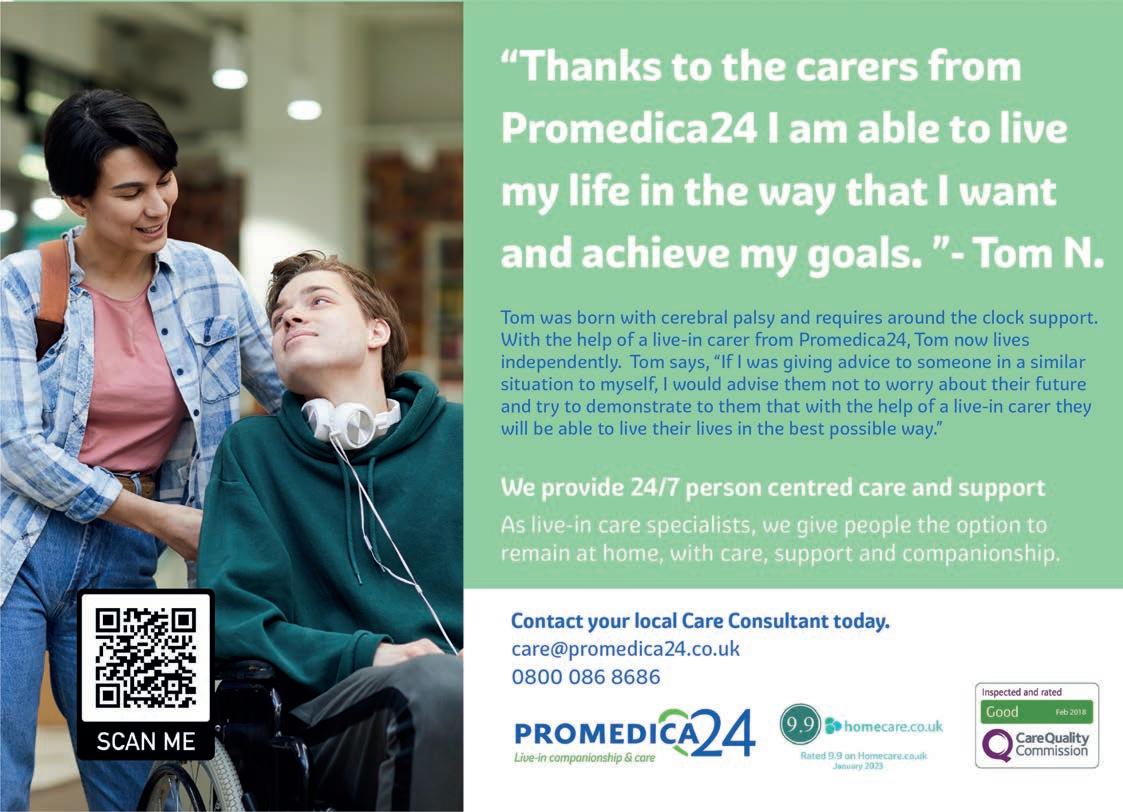
Visit dashrehab.co.uk/robooter-x for more details 0845 146 0600 • sales@rhealthcare.co.uk AVAILABLE EXCLUSIVELY FROM DASH REHAB. ROBOOTER POWERCHAIR
really enjoying using my new ROBOOTER POWERCHAIR. It is lovely to drive and so comfortable to sit in, I almost don’t want to get out of it! It’s perfect for those tight spaces when there is not very much room to turn. The fact that it can go so far on one charge is a bonus as well. LOST VOICE GUY, LEE RIDLEY
I’m
Tim Rushby-Smith
Originally from London, writer, artist and paraplegic Tim Rushby-Smith is now based in Australia. He is the author of two books: Looking Up and Beyond the Break.

Follow Tim on twi er @trushbys
DEFINING DISABILITY

Yet another of those conversations about disability (that happen all too frequently) took place at the self-checkout in the supermarket. My packing skills are so good that my shopping bag resembles a game of Tetris, and this had apparently caught the eye of a man at the next till. His response?
“You’re so much more able than my son. But that’s because he’s lazy, so he’s rubbish at most things. He’s useless”
“Having you as a dad is probably the biggest impairment he faces,” is what I didn’t say in reply. Instead, I smiled thinly and went about my day. In part this was because I didn’t immediately twig that he was saying
‘able’ in the context of ‘disabled’. It begs the question: What do we mean when we say disabled? Legal definitions are broadly similar around the world, but not identical.
GLOBAL
In the UK, The Equality Act 2010 states: ‘A person has a disability if: a. They have a mental or physical impairment, and b. The impairment has a substantial and long-term adverse e ect on the person’s ability to carry out normal day-to-day activities’.
While in Australia, The Disability Discrimination Act defines disability as:
‘The total or partial loss of the person’s bodily or mental functions. The total or partial loss of a part of the body. The presence in the body of organisms causing disease or illness’.
And in the US, the Center for Disease Control defines disability as:
‘Any condition of the body or mind (impairment) that makes it more di cult for the person with the condition to do certain activities (activity limitation) and interact with the world around them (participation restrictions)’.
In his latest column Tim Rushby-Smith discusses the di
NORMAL
Interestingly, only the UK includes ‘long-term’ in the definition. Does this mean that inebriation is a form of disability in Australia or the US?
Meanwhile, Australia includes a reference to the presence of organisms causing disease or illness. So that presumably excludes viruses which most biologists do not consider to be organisms. And the US is the only definition to include ‘participation’. Which could mean that, in the event of su cient adjustments being made to make full participation possible for the whole population, disability would cease to exist.
All of which is pedantry of the highest order, I admit. But disability is hard to define. My experience as a wheelchair user for example, is very di erent to that of someone with a sensory impairment, or someone with intellectual or psychosocial disability.
We are defined by what we are not, which is what some people would describe as ‘normal’. Now, who feels like having a stab at a definition for that? In the next issue, I will revisit this idea and delve further into the topic.
28 enablemagazine.co.uk
enable voices
I didn’t immediately twig that he was saying ‘able’ in the context of ‘disabled’
erent ways countries around the world define disability
WIN
AN AMAZON KINDLE

WORTH OVER £90
Enter our latest competition and be in with the chance to win a Kindle worth £94.99, helping you to get reading this autumn and winter. The six-inch tablet is Amazon’s lightest and most compact Kindle yet, making it easier to hold for long periods of time, and to carry with you if you want to take it out of the house. With a glare-free, paperlike display, and the option to adjust the brightness, you can read comfortably without the need to hold heavy books for long periods of time. This Kindle has been made specifically for reading, helping you to take a break from messages, e-mails, social media notifications and other distractions you could face on a regular tablet. With 16GB of storage and a ba ery life of up to six weeks, you can download thousands of books to enjoy.



HOW TO ENTER
Simply send us your name, contact details and where you picked up your copy of Enable.
BY EMAIL competitions@dcpublishing.co.uk quoting Kindle 2023

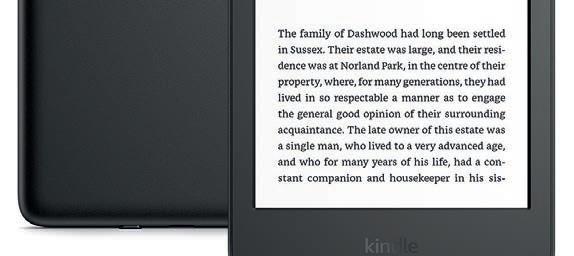
ONLINE www.enablemagazine.co.uk/kindle2023
BY POST Competition, 198 Bath Street, Glasgow, G2 4HG

All entries must be received by Monday 23 October 2023. Good luck!
TERMS AND CONDITIONS: All entries must be received by Monday 23 October 2023. The prize is one Amazon Kindle which will be sent to the winner. The prize is nontransferable, non-refundable, there is no cash alternative and cannot be sold to another party. The contents of the prize may differ from the images and descriptions included here. One entry per household. The publisher’s decision is final. If you do not wish to receive further communications from Enable Magazine, include ‘opt-out’ in your entry. This competition is not being run in conjunction with Amazon.
enablemagazine.co.uk
This issue, we’re giving Enable readers the chance to win the lightest and most compact Kindle yet
PICS: © AMAZON.COM, INC enable competition

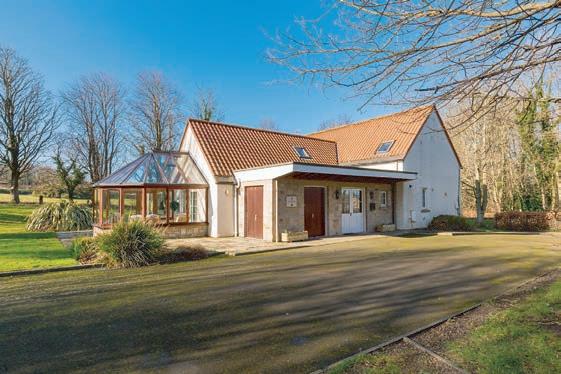


































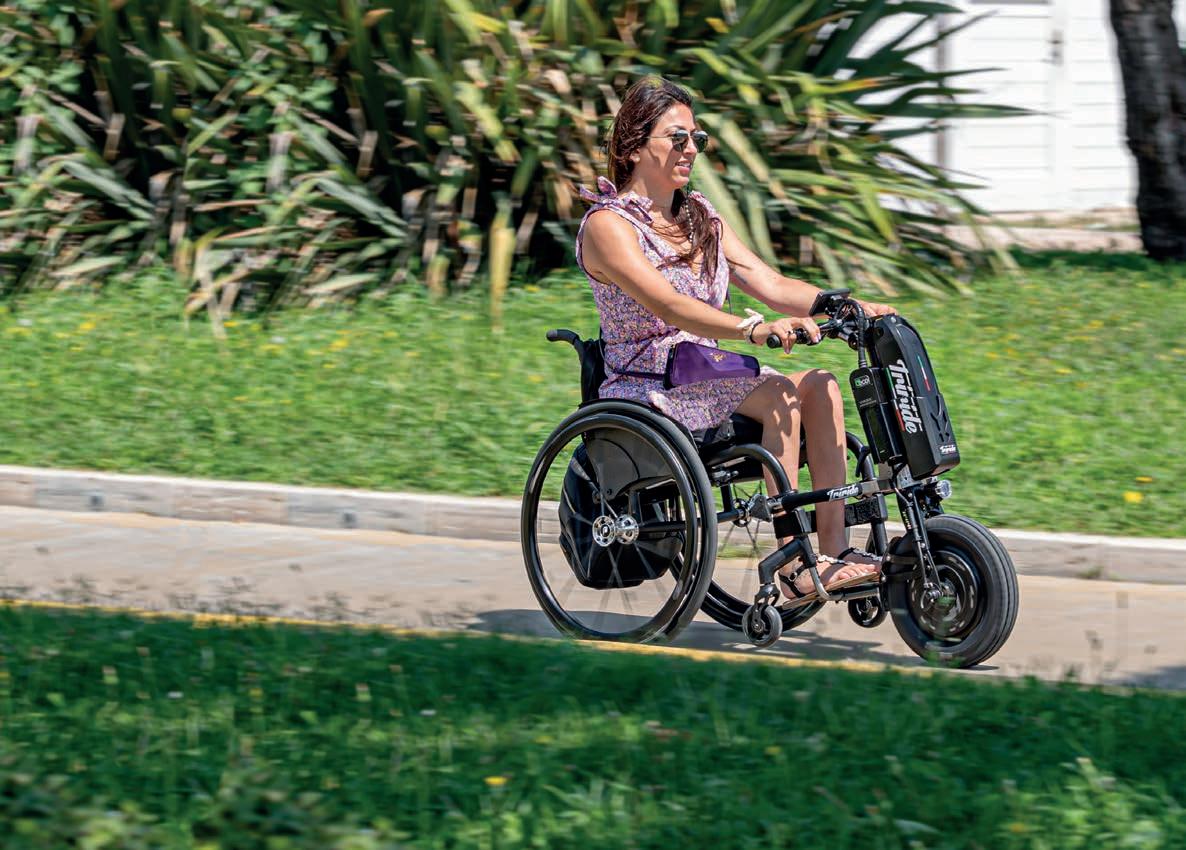

























































































Self-catering breaks Leuchie’s fully accessible, self-catering holiday accommodation in East Lothian. To find out more and book, visit leuchiehouse.org.uk/self-catering Speak to Jo or Katy to book on 01620 892864 leuchiehouse.org.uk Tailored short breaks with 24 hr nursing care Leuchie is a charity registered in Scotland no SC042249 Out-of-this-world Planetarium Nature adventures Spark your curiosity at Winchester Science Centre Explosive live science Free carer tickets Accessible and Changing Places facilities BSL Days Recombobulation Room - quiet space Book now - www.WinchesterScienceCentre.org FREEDOM Intelligent Braking System Intelligent Cruise Control Motion Direct Control
Thisyear,GoldenLaneHousingcelebrates 25yearsofprovidingbespokesupported housingforpeoplewithlearningdisabilities andautisticpeopleacrossEngland,Wales andNorthernIreland.Supportedhousing canbetransformational,offeringpeople opportunitiestoliveindependently.

Thereareincreasingdemandsbutthere continuestobelimitationsongovernment grants,andpressuresonlocalgovernment resourcestosupportnewprovision.Golden LaneHousing werefoundingmembersofthe LDAHN,acoalitionofhousingassociations promotingbestpracticeandinfluencing changetosupportnewprovision.
Anewreport,'Supportedhousingforpeople withlearningdisabilitiesandautisticpeople inEngland,'commissionedfromHousingLIN bytheNetwork,waslaunchedthissummer, aimingtoprovidedataandinsightabout thisparticularsectorofsupportedhousing. Theresearchprovidesacomprehensive evidencebaseofthefutureneedandsets outclearrecommendationsthatthe Networkbelievewillhelpsupportthe provisionofnewhousing.



Theresearchestablishesthatover35,500 people,themajoritywithsignificant commissionedsupport,arelivingin supportedhousing.Thereportsuggests thatoverthepastfiveyears,over1,000 newhomesperyearhavebeencreated. However,HousingLINestimatethatover 1,800additionalhomesareneededeach yearoverthenext15years–that’s


27,000individuals-whichwillrequire over£340millionperyearofprivateand publicfunding.Ourcalltogovernmentis tosupportnewprovisionbyincreasing thelevelofcapitalfundingand supportingtherightconditionsfor privatefinancefunding.Webelievethat governmentshouldsetandpublish annualtargetsforsupportedhousing andensuretherecontinuestobethe appropriatelevelsofwelfarebenefit.

ThenewSupportedHousing(Regulatory Oversight)Actwillintroduce requirementsonlocalauthoritiesto developlong-termstrategicplans,and helpdriveupstandardsthroughnew nationalsupportedhousingstandards andlicensingschemes.Ourcalltolocal authoritiesistoworkwithindividuals, families,housingassociationsand supportproviderstoco-producethese newstrategies.
Goodqualitysupportedhousinghasa vitalroletoplaytoprovidealifetimeof independence.Nowisthetimeforallkey partiestocometogethertorespondto thechangesneededtosupportnew provision.







Readthefullreport:









https://www.glh.org.uk/about/thelearning-disability-and-autismhousing-network/

"Goodqualitysupported
" "GGooood d q quuaalliitty y s suuppppoor r housinghasavitalroleto h hoouussiinng g h haas s a a v viittaall r roolle e playtoprovidealifetimeof p pllaay y tto o p prroovviidde e a a lliiffeettiimme e iindependence." i in n nd d de e ep p pe e en n nd d de e en n nc c ce e e.. . " "
JohnVerge,ChiefExecutive,GoldenLane Housing,andChair,LearningDisability andAutismHousingNetwork(LDAHN) writesaboutthelatestresearchinto supportedhousingforpeoplewith learningdisabilitiesandautisticpeople.
Planning ahead
Understanding Lasting Power of A orney and the importance of wills and trusts can help not only you, but your loved ones in the future
enable life 33 enablemagazine.co.uk
Planning for the future can be a daunting topic, but doing this as early as possible can save additional stress down the line. Learning about Lasting Power of A orney and the importance of wills and trusts will ensure what you want, or how you want your money to aid your loved ones in the future, is upheld when you are no longer able to make your own decisions.
UNDERSTANDING POWER OF ATTORNEY
In the UK, the Mental Capacity Act 2005 empowers people to make their own decisions, and where necessary, with support. For people living with a diagnosis that a ects their understanding, decision making and communication, Lasting Power of A orney (LPA) can o er a form of supported decision making. This allows you to give a person you trust the power to make decisions on your behalf if you don’t have the capacity to do so. Anyone over the age of 18 who has the mental ability to make financial, property or medical decisions for themselves can arrange for someone else to make these decisions for them in the future.
There are two types of LPA that can be put in place: property and financial a airs, and health and welfare. A property and financial a airs LPA can help you in managing your bank or building society accounts, paying bills, collecting your pension or benefits, and if necessary, selling your home. A health and welfare LPA has the power to make decisions about your daily routine, your medical care, moving into a care home, and lifesustaining medical treatment.
Taking on this role can be a lot of responsibility for a loved one, so the person living with the condition and the person they would like to hold LPA should discuss this in depth before taking the necessary legal steps to put it in place. The Mental Capacity Act 2005 requires the person making the LPA to have the mental capacity to consent to this, ensuring that their best interests are upheld. This means that a LPA should be put in place as early as possible.
The terminology around LPA can be di cult to understand, and a lot of choices have to be made during the process. A solicitor can help during this time so that you understand the legal language and what is involved.
Not everyone who has a progressive disability or a learning disability needs a LPA, and you should do thorough research before taking this step.
HELP WITH WILLS AND TRUSTS
Wills and trusts are just as, if not more, important than understanding LPA. If someone with a disability has an inheritance le to them directly, this can cause complications, even leading to the loss of their means-tested benefits and support packages. Parents, carers and other family members don’t need to be alone in their planning, with disabled people’s organisations ready to o er help.
The Mencap Wills and Trusts Service exists for this purpose, helping families to plan for the future. Emma Young is a senior o cer at the service and is experienced in helping families access information about se ing up a discretionary trust so that a loved one with a learning disability has financial security and can continue doing the things they love “No-one likes to think about what is going to happen to their child when they’re no longer around, so we do understand that this can be a di cult topic for people to talk about, but it’s so important to
get those wills wri en and trusts set up,” highlights Emma. “A lot of people don’t realise what they need to put in place and that’s why we o er this support. It’s so important that people can make sure their loved one is financially protected.”
The service o ers a wide range of support which includes a dedicated phone line, and free, comprehensive Wills and Trusts Guides. Mencap also runs free online seminars for parents. Held on Zoom, the seminars are an opportunity to hear from Mencap’s Wills and Trusts Service and provide a chance to ask questions to a legal professional who specialises in this complex area of law.
“Each webinar lasts for an hour and 30 minutes and is led by a legal professional who explains the importance of writing a will and se ing up a trust for a loved one with a learning disability,” explains Emma. “They speak about the di erence between a discretionary trust and a disabled person’s trust, as well as the importance of writing a le er of wishes, and how a trust works. There’s also time for questions at the end of the seminar.
“It can be a lot of information to take in, so the next day everyone receives an email from us with the presentation they saw, and they also get the opportunity to receive a follow-up from the legal professional who presented.”
While the Wills and Trusts team at the charity can’t provide legal advice on individual situations, they can give guidance or help direct parents to a specialist legal professional for support. Find out more about the Mencap Wills and Trusts Service for parents and carers online (www.mencap. org.uk/willsandtrusts), by calling 0207 696 6925, or by emailing willsandtrusts@mencap.org.uk
FOR MORE INFORMATION
There are a host of organisations that can give guidance and support on the topic, or help to answer any questions you have before you start the process. Mencap Trust (mencaptrust.org.uk), Age UK (www.ageuk.org.uk) and Focus on Disability (www.focusondisability.co.uk) are all great resources.
enable life
This can be a di cult topic for people to talk about, but it’s so important to get those wills written and trusts set up
enablemagazine.co.uk 34





Explore our accessible homes For full L&Q terms and conditions visit lqhomes.com. All details are correct at time of print. Copyright © 2023 L&Q Group. All Rights Reserved. lqhomes.com/accessibility Register your interest on A collection of spacious wheelchair accessible homes exclusively available through Shared Ownership Coming Soon L&Q at PLUMSTEAD Coming Soon L&Q at Coming Soon L&Q at 31/07/2023 09:29 Royal Mencap Society, 6 Cyrus Way, Hampton, Peterborough PE7 8HP Registered charity number 222377 (England and Wales); SC041079 (Scotland) 2023.08 Are you worried your loved one with a learning disability will not get the financial protection they need when you’re no longer around? Rest assured, Mencap’s Wills and Trusts service can offer guidance and support to help you navigate this area of law. Free online webinars led by a legal professional on wills and trusts. Free guides that discuss the different aspects associated with wills and trusts. A list of specialist legal professionals who can assist in putting these provisions in place. A knowledgeable and dedicated team available for those planning for the future. If you would like further information visit: www.mencap.org.uk/willsandtrusts or scan the QR code 020 7696 6925 We provide:
A PLACE TO CALL HOME
Buying your own home can make finding an accessible property easier, and shared ownership could help you get on the property ladder for less

36 enablemagazine.co.uk
Your home should be a place that you want to be and that works for you, and a house that fits your needs is essential to having a high quality of life. The provision of inclusive and accessible housing in the UK is improving, but there is still a long way to go. During July 2023, the Levelling Up, Housing and Communities Commi ee launched an inquiry in to what the government can do to ensure disabled people have access to accessible and adaptable housing in England. This is becoming a priority across the sector with the government previously commi ing to raising the minimum accessibility standard for new homes in 2022. Whilst these may be small steps towards a more inclusive housing market, it can make the idea of purchasing your own home more appealing and realistic. Ge ing on the property ladder can happen in di erent ways, and shared ownership is a great option for anyone who wants to buy a home but is worried about the financial commitment it will involve.
GETTING ON THE LADDER
Every September, Shared Ownership Week showcases the scheme that helps buyers on to the property ladder, but you can utilise the scheme all year round if you are looking to buy a home. The awareness week gives people interested in the scheme a chance to learn more about it directly from providers. Buying a property through the scheme doesn’t involve sharing your space with someone else, but sharing the equity with another party. Shared ownership means that you own a share of your property, and a housing association owns the rest. In this case, you will have a mortgage for the amount you own, and you will also pay rent on the share that the housing association owns.
The amount you can own when you first buy your property is di erent depending on where you live: in England, you can own anything from 10 per cent to 75 per cent of the home, whereas in Scotland this is between 25 per cent and 75 per cent. That means
that if you bought 25 per cent of a house worth £100,000, you would own £25,000 of it and the housing association would own £75,000 of it. In some cases, you can buy more shares in your home over time, and you could even have the chance to own 100 per cent, but you can also keep your agreement the same if you don’t want to buy any more shares, or can’t a ord to. If you decide to sell your home and the housing association still owns shares, you would receive a percentage of the money from the sale, equivalent to the shares you own.
ELIGIBILITY
Shared ownership isn’t solely available for first time buyers, anyone who meets set criteria can apply. Generally, to be eligible to apply for shared ownership, your household earnings must be less than £80,000 outside of London or less than £90,000 if you live in London; you have to be either a first-time buyer or have previously owned a home and can’t a ord to buy a new one that suits your needs; and in most cases you have to already live within the area that you are applying in. If you currently own your home, you have to be in the process of selling it to apply.
You’ll also need a deposit to secure a mortgage for your share of the home, this is normally 10 per cent of the value of your share, but some banks may accept less depending on your circumstances. For families where someone in the household has a disability, you could apply to the scheme to buy a home that suits your loved one’s specific needs.
The type of home you can buy using the scheme is limited to new builds, or homes that are
currently listed through a housing association’s resale programme. If you think you are eligible, you should get in touch with your local registered provider and homebuy agent to start your application.
Once your application is in place, they will be able to help you search for available properties in your area and once you find the right one, you can reserve it. You can discover agents in your local area at www. ownyourhome.gov.uk
ADDITIONAL SUPPORT
Whether you are looking to take your first step on to the property ladder or move up it, there is support available to help specific communities who would benefit from sharing equity. The Older People’s Shared Ownership (OPSO) scheme has the same principles as traditional shared ownership, but it is only available to people who are over the age of 55. Under the scheme, once you own 75 per cent of the home, you won’t have to pay any rent on the remaining share.
Di erent to shared ownership and OPSO, the Home Ownership for People with Long-Term Disabilities (HOLD) scheme gives disabled people the chance to buy a home on the open market with similar conditions if there are no properties available through another scheme that meet your needs. This can be especially helpful if you are struggling to get an appropriate home, but believe a newer house which meets modern accessibility standards would help you.
Residents in Scotland who have a disability and need alternative housing could be eligible for between 10 per cent and 40 per cent towards the cost of their home through the Sco ish Government’s Open Market Share Equity scheme (OMSE). This helps first time buyers and priority groups get on to the property ladder including disabled people, older people and social renters. Find out more on the Sco ish Government website (mygov.scot).
To find out more about Shared Ownership, visit www.sharedownershipweek.co.uk
37 enablemagazine.co.uk
enable housing
FOR MORE INFORMATION
You could apply to the scheme to buy a home that suits your loved one’s specific needs
If you have a disability and are in need of alternative housing, you could be eligible for up to 49% towards the cost of a home through the Scottish Government’s LIFT scheme*.



Find out more: Text LIFT to 66777


www.linkhousing.org.uk/ LIFT-disability



Limitless, British Cycling’s brand new inclusive club programme provides cycling opportunities for disabled people, regardless of age, impairment and ability.

Our ambitions is to create a network of inclusive clubs across the country, where disabled people can take part in cycling opportunities.
Whether you wish to try cycling for the first time, or you are an an experienced rider looking to take your cycling to the next level our network of Limitless Clubs will have an opportunity for you.
Scan the QR code or visit our website for more info:
www.britishcycling.org.uk/Limitless
“I would highly recommend the LIFT scheme if you are requiring more suitable accommodation for a disabled person.”
*Eligibility criteria applies.
Francesca, LIFT scheme buyer
THE POWER OF community
Across the UK, grassroots community projects are making a di erence to the everyday lives of disabled people, fostering a sense of unity and empowerment
In a world where mainstream inclusion o en falls short, grassroots community projects have emerged as catalysts for change in local communities around the country. These projects, o en initiated by people with a passion for helping others, or based on their own experiences, are creating spaces where disabled people, their parents and other family members find camaraderie, support, and a sense of belonging. With a quick read or search, you could discover a project in your local area, or you might want to launch a project in your own community using the funding and resources currently available.
Wheels For All Debdale

Manchester
www.cyclinguk.org
In the heart of Manchester, Wheels
For All Debdale is a project rolling forward with the goal of fostering connections among disabled people and their families. This cycling group, specially designed for people who need to use adapted cycles, o ers not only the joy of cycling but also a network of emotional support. Riders can cycle around Hyde Park in Gorton, Manchester, with a choice of paths and a wide range of adapted bikes to choose from. All sessions are run by trained sta and volunteers.
Horizons Glasgow
Glasgow
www.ydance.org
Horizons Glasgow is redefining dance by o ering a haven for young disabled people to showcase their talents. Through workshops and performance
opportunities throughout the year, disabled and non-disabled dancers work alongside each other to develop their technical dance skills and choreography. Open to young people aged between 12 and 25-years-old, there is no fee to be a member, but you do have to be from or living in Scotland.
Surviving by Storytelling
Lincolnshire
www.writingeastmidlands.co.uk
Surviving by Storytelling, based in Boston, Lincolnshire, is a creative writing project, helping people find their voice in a safe and inclusive environment through free workshops. Every session helps participants to explore their mental health through writing, with guidance from writer and assistant professor of mental health at the University of No ingham, Dr Mark Pearson, and Dr Helen Foster, a research associate from the University of Leicester.
enablemagazine.co.uk
enable life
You might want to launch a project in your own community
Inclusive Play
Hackney, London
www.hackneyplay.org
In the urban landscape of London, Inclusive Play is rewriting the rules. This project, run by Hackney Play Association, has created a host of opportunities to help disabled children and their families access inclusive play to tackle isolation and exclusion. Every Saturday, they run a stay and play session for disabled children at Pearson Street Adventure Playground; have inclusive play services at four play areas in the community; and continually link up with other play providers and services to expand the opportunities available for disabled children.
Food Train
Dumfries and Galloway
www.thefoodtrain.co.uk
Food has the ability to bring people together, and in the cost of living crisis, this experience can be lost. For more than two decades, Food Train, a voluntary organisation and social enterprise, has been providing vital services for older people who are no longer able to shop or cook independently due to age or a disability. The team makes hundreds of grocery deliveries each week, whilst also helping with household jobs, delivering books through a library service, and providing social contact and meals through their Meal Makers and befriending services.
Launching a project
The journey to starting a grassroots community project can seem overwhelming, but there are funding options and resources available to get you started. Organisations like the National Lo ery Community Fund (www.tnlcommunityfund.org.uk) and Comic Relief (www.comicrelief.com) are dedicated to supporting community initiatives big or small.
If your project is inspired by your own experiences, platforms like Kickstarter (www.kickstarter.com) and GoFundMe (www.gofundme.com) can help you tap into the power of community. Launching a campaign that highlights your project’s mission, impact, and personal connection can help you secure funding whilst connecting with people who resonate with your story.
For guidance and advice, reach out to established grassroots projects and ask about what they have learned since launching.
RESOURCES
Enthusiasm is o en the driver behind starting a community project, but knowledge is the fuel that sustains it and makes it a success. It’s important to equip yourself with the skills and information needed to ensure your project is sustainable.
Social Enterprise UK (www. socialenterprise.org.uk)
o ers resources, training, and networking opportunities for people looking to create impactful social projects.
Local government bodies (www.gov.uk) o en have grants and support programs for community projects. Reach out

FOR MORE INFORMATION
to your local council to explore available resources.
Engaging with online forums and social media groups dedicated to community projects through platforms like Reddit (www.reddit.com) and Facebook (www.facebook.com) can help you find communities where you can exchange ideas and seek advice.
Across the UK, these projects are helping disabled people, parents, and families through shared experiences and tackling isolation. Whether you’re aiming to support, contribute, or initiate your own project, taking the first step can create a more inclusive future.
Disabled people’s organisations like Scope (www.scope.org.uk), Leonard Cheshire (www.leonardcheshire.org) and Mencap (www.mencap.org.uk) provide valuable information on disability-related initiatives.
4 enablemagazine.co.uk
enable life
The original Quest 88 adjustable therapy benches, now available direct from the manufacturer.

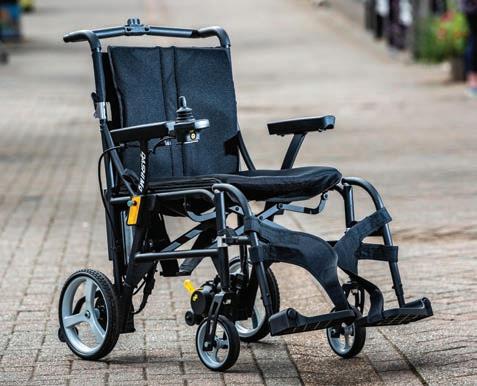
We directly retail to consumers, physiotherapists, schools, charities and the NHS directly or through equipment providers.


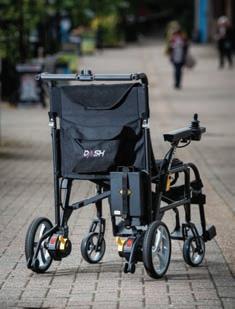
Benches are available in Small, Large and ExtraLarge and in a wide range of beautiful colours!


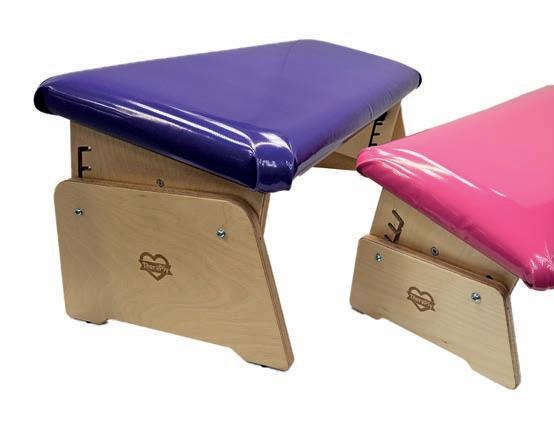
Enquiries, quotations and orders to:


theraply@lydwood.co.uk

For more details visit: dashrehab.co.uk/dashi-mg/ 0845 146 0600 • sales@rhealthcare.co.uk
ONE OF THE WORLD’S LIGHTEST POWERCHAIRS BUILT WITH YOU IN MIND Lightweight Easy to transport and transfer –perfect for car + airline travel Travel up to 9 miles on a single charge Foldable with leg rests Stylish Dashi Advert.indd 1 25/08/2023 12:33:53
DASHI Mg
out
at www.theraply.uk 5% off using code ENABLE5 Introducing
Therapy Benches Find
more
Garlic chicken Creamy chickpeas, spinach & sumac
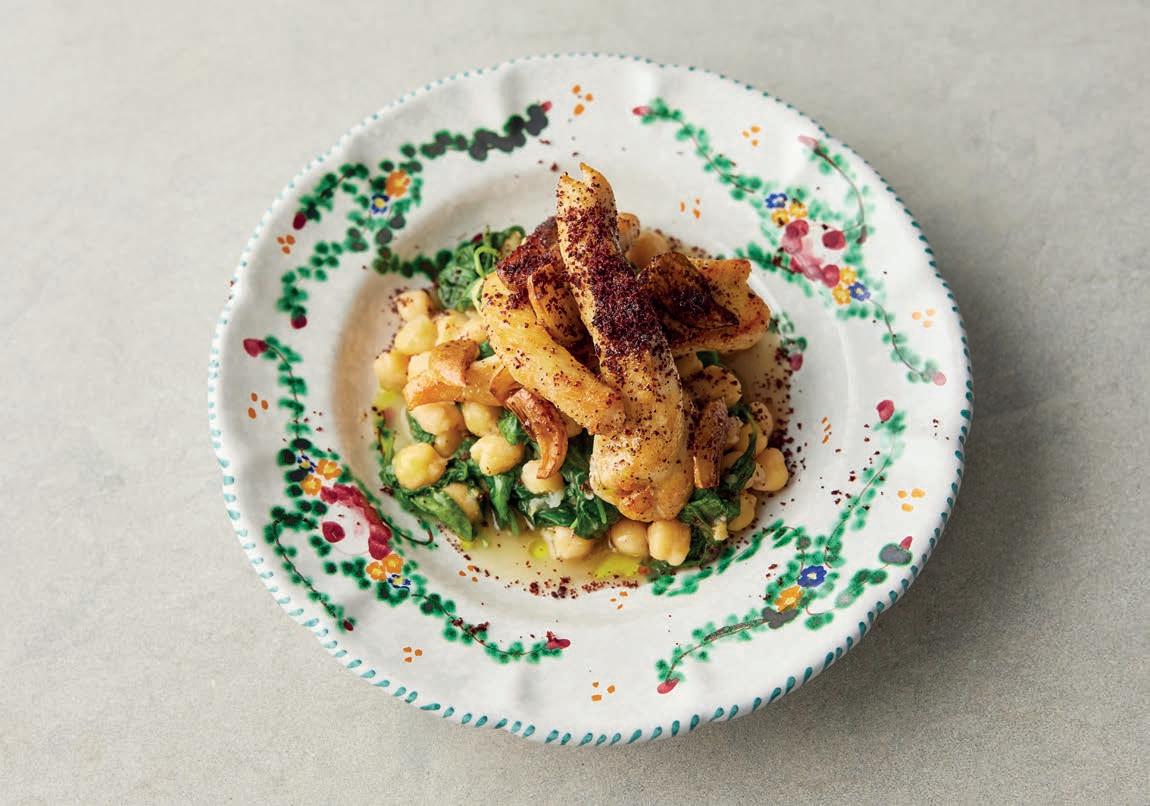
Inspired by some of the wonderful flavours of Lebanon, this quick dish is perfect for an easy meal. Hunting out nice fat jarred chickpeas is game-changing when it comes to both flavour and texture.
SERVES: 2
TOTAL TIME: 18 MINUTES
INGREDIENTS
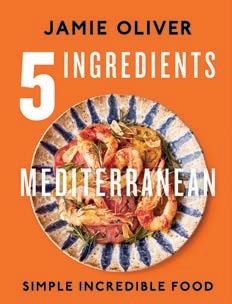
4 cloves of garlic
2 x 150g skinless chicken breasts
½ x 700g jar of chickpeas
250g baby spinach
1 heaped teaspoon sumac
PANTRY
Olive oil
Sea salt

Black pepper
Red wine vinegar
Peel the garlic cloves and slice lengthways, then place in a large non-stick frying pan on a high heat with 1 tablespoon of olive oil, stirring regularly. Slice each chicken breast lengthways into 3 strips, then toss with a pinch of sea salt and black pepper. Once the garlic is nicely golden, quickly remove from the pan with a slo ed spoon, leaving the flavoured oil behind. Go in with the chicken and cook for 5 minutes, or until golden and cooked through, turning regularly.
Remove the chicken from the pan and tip in the chickpeas (juices and all). Add the spinach, along with most of the garlic and 1 tablespoon of red wine vinegar, then toss over the heat until the spinach has wilted and the chickpeas are hot through. Season to perfection with salt and pepper, then return the chicken to the pan and finish with the reserved garlic and a generous dusting of sumac.
4 enablemagazine.co.uk
RECIPE enable life
ENERGY FATSAT FAT PROTEINCARBSSUGARS SALT FIBRE 406kcal13.3g2.2g48.8g23.2g3.1g1.3g 1.1g PIC: © CHRIS TERRY JAMIE OLIVER'S
5 Ingredients Mediterranean by Jamie Oliver is published by Penguin Michael Joseph © Jamie Oliver Enterprises Limited (2023 5 Ingredients Mediterranean). Recipe photography: © David Loftus, 2023.
Chipping Campden’s history in stone is the Cotswolds’ hidden gem -an idyllic centre for easy access to the local towns and villages, Stratford, Cheltenham, Gloucester, Oxford, Warwick & Worcester, etc.



George Barn is within no more than a 7 to 8 minute walk to the curved High Street, its inns, restaurants, shops & attractions.











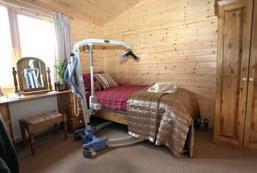


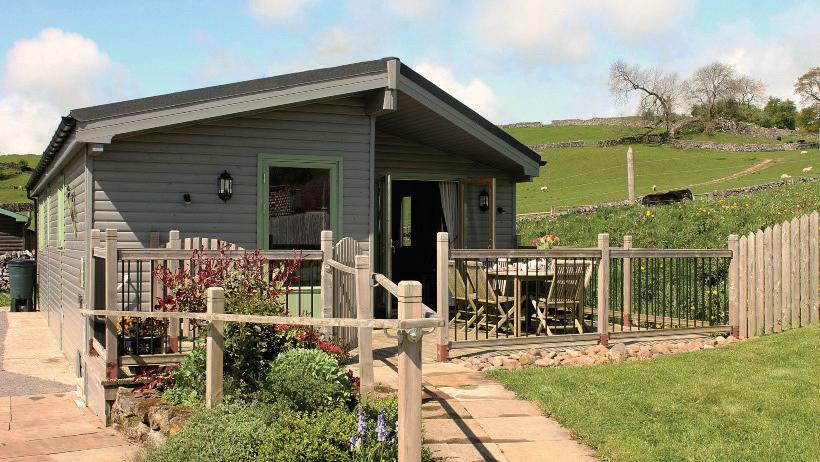

Rollinwetroomshower Off-roadwheelchairhire Staysomewherespecial Wheelchairaccessible Self-cateringlogcabins inthePeakDistrictcountryside Mobilehoist Specialistequipment www.hoegrangeholidays.co.uk tel:01629540262
A A 4—Star Self catering
Mobile/Text:
Visit our website:
Michael Haines George Barn, Blind Lane, Chipping Campden, Glos. GL55 6ED
07889 649812 Email: info@cotswoldcharm.com
www.cotswoldcharm.com
We want everyone to be able to access and enjoy all that Aberdeen Performing Arts has to o er. • Audio described performances • BSL interpreted performances
Captioned performances • Relaxed performances
Hearing assistance
Touch tours • Essential companions Find out more at aberdeenperformingarts.com/access
•
•
•
AN ACTIVE LIFESTYLE
Introducing
Across the UK, local and national organisations are changing the tone in sport and making it more inclusive. For people who want to get more active, whether it’s to add more exercise into your routine or because you have a passion for a particular sport, opportunities could be a quick search away.
You could be a complete beginner, an expert in a particular sport or activity, or be revisiting your favourite past time a er acquiring a disability. Regardless of what stage you are at in becoming more active, there are organisations poised to help.

EVERY BODY MOVES
These are just a few of the charities, governing bodies and organisations o ering inclusive and adaptive opportunities. You may be able to find more in your local area by using a search tool like the one from Every Body Moves (www.everybodymoves.org.uk), previously known as Parasport. The initiative has been developed by Paralympics GB and Toyota to showcase opportunities to become more active. Along with the search tool, you can read about people’s experiences, access home workouts and find ways to get involved whether you want to get active, are a parent, or a coach.
CRICKET
The England and Wales Cricket Board (ECB) has a wealth of opportunities for people of all levels to get involved and find playing opportunities. At the heart of all ECB initiatives is club cricket where all players can have a go at local level. The board also has a Disability Cricket Pathway, starting o at this level and going all the way up to national teams. At this level,
disability cricket is usually split into four categories: hearing impairment; learning disability; physical disability; visual impairment. Alongside this pathway, ECB have a fully accessible programme for children aged five to eight-years-old, All Stars Cricket, and one for eight to 11-year-olds, Dynamos Cricket. Find out more online (www.ecb.co.uk).
44 enablemagazine.co.uk
more activity into your routine can help you socially, emotionally and physically, and there is a host of organisations ready to welcome you in to a local club to help
Staying active can be essential to both mental and physical health
ACTIVITY ALLIANCE
Activity Alliance (www.activityalliance.org.uk) are a charity that believes fairness in sport is paramount, and want to close the gap between disabled people’s level of inactivity and that of non-disabled people. The charity runs programmes, spotlights inclusive and accessible gyms, and importantly, provides training to help clubs become more inclusive.
LIVING SPORT
As part of Sport England’s Active Partnerships network, Living Sport (www.livingsport.co.uk) are helping people to live happier, healthier and more fulfilled lives by focussing on movement, sport and physical activity. The charity has resources for schools to help make sport more inclusive, as well as support for adults, families and local community groups.
HORSERIDING
Have you ever tried inclusive horse riding? With the Riding for the Disabled Association (www.rda.org.uk) you could get the chance to. With opportunities around the country, the charity welcomes people with physical and learning disabilities of any age, o ering activities like riding and carriage driving alongside fitness and skills development opportunities.

SPECIAL OLYMPICS
Special Olympics Great Britain (www.specialolympicsgb. org.uk) is one of the longest standing inclusive sporting programmes around, and for good reason: the non-profit organisation is the largest provider of year-round sports training and athletic competitions for children and adults with intellectual disabilities. The organisation’s pathways are designed to progress athletes from local competitions through to elite level, o ering 27 di erent sports from ice-skating and skiing to judo and football.
FUNDING AND SUPPORT
While staying active can be essential to both mental and physical health, keeping up a hobby can become expensive, especially if you plan to join a local league. Luckily, a host of organisations o er grants and other funding opportunities that can help clubs and individuals to keep fit through movement.
Caudwell Children (www.caudwellchildren.com), a charity supporting disabled and autistic children, can support children and families with the cost of mobility, sports and sensory equipment to help them live an independent life. You can fill out a simple application on the charity’s website that asks questions about the person using the equipment and household earnings.
Get Kids Going! (www.getkidsgoing.com) is a national charity helping young disabled people up to the age of 26 by providing them with specially built sports equipment, as well as sports grants. This funding can help with everything from training and physiotherapy to competition fees, sports equipment, and travel. This funding is o en focussed on young people who want to become an elite athlete in their sport.
The Sports Foundation for the Disabled (www. sportsfoundationforthedisabled.org) helps fund disability sport in South West England and Wales, from grassroots through to elite athletes. This support is also available for organisations, clubs and charities who support disabled people. The website has a helpful breakdown of criteria, how to apply, and what happens next.

45 enablemagazine.co.uk
enable active
PIC: © RDA / @ LOUISE CLARKE PHOTOGRAPHY
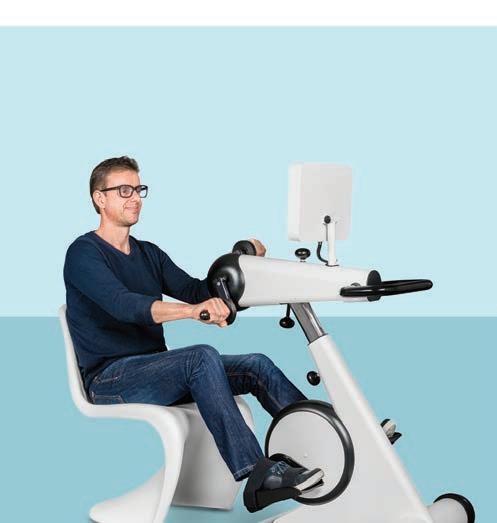
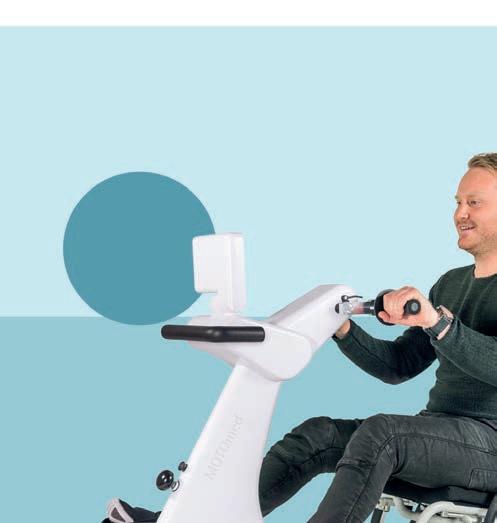

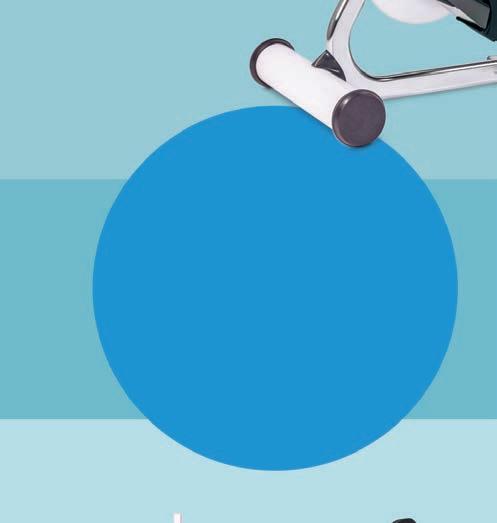





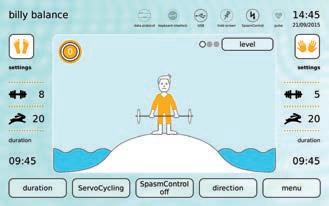














www.motomed.com
CHANGE AIR


From a lack of appropriate support and sta who haven’t been trained on how to best aid people with access needs, to the fear of essential equipment being damaged, broken or lost, it is no wonder that many people would rather stay at home than risk a trip overseas. As disabled people have shared their experiences online and demanded change over the last few years, it is slowly happening.
CHANGE
The Rights on Flights campaign, championed by author and TV presenter Sophie Morgan and the team at Disability Rights UK (DRUK), has become a beacon of hope for millions of disabled people who want to travel but worry about damage to essential mobility equipment. Sophie’s personal passion for inclusivity and equality has been the driving force behind the campaign, with her own wheelchairs being damaged on flights multiple times in the past. Sophie and the DRUK team have been advocating for the rights and needs of disabled
passengers to be legally recognised, shining a light on the long-standing issues that have plagued the aviation industry. Since the campaign launched in February 2023, Sophie has met with airlines, airports, Members of Parliament, and importantly, the Civil Aviation Authority (CAA).

The campaign has sparked a narrative that supports more regulation in the UK air industry, and now, the CAA have responded to the calls for reform. The regulator has recognised the need for urgent change to accessibility in air travel, and has released a list of updated regulations and guidelines to try and create positive change, helping disabled people to feel more confident and safer when travelling.
REGULATION
The new framework will see be er standards for bringing assistance dogs on flights, how mobility equipment is handled, and be er compensation if equipment is damaged or lost.
Alongside the CAA, the UK Government has recognised the need for changes to create a more
inclusive air travel industry. The government has now commi ed to changing legislation to be er protect disabled people when flying. In June 2023, plans were published that include stronger enforcement powers, access to faster and cheaper dispute resolution, and increased compensation for damaged wheelchairs.
While these steps should be celebrated, it is essential to acknowledge that these issues have gone on too long and more needs to be done: for years the disability community has faced barriers, both physical and in a itudes, while seeking the same opportunities to explore and connect with the world as non-disabled people.
As we move forward, the push to create a world where accessible air travel is not a privilege but a right will continue.
FOR MORE INFORMATION

To find out more about the Rights on Flights campaign and get involved, visit the Disability Rights UK website (www.disabilityrightsuk.org)

47 enablemagazine.co.uk
For too long, disabled people have faced challenges when travelling, discouraging them from utilising air travel and seeing new places around the world
enable travel
in the











27 NOV – 13 JAN LYRICS BY TIM RICE MUSIC BY ANDREW LLOYD WEBBER DIRECTED BY NIKOLAI FOSTER ORCHESTRATIONS BY DAVID CULLEN AND ANDREW LLOYD WEBBER BASED ON ORCHESTRATIONS ORIGINALLY BY ANDREW LLOYD WEBBER BY ARRANGEMENT WITH THE REALLY USEFUL GROUP LTD Audio Described & Touch Tour Fri 15 Dec, 7.30pm and Thu 11 Jan, 2.15pm British Sign Language Interpreted Tue 19 Dec, 7.30pm Captioned Wed 20 Dec, 7.30pm and Thu 28 Dec, 2.15pm Relaxed Sat 6 Jan, 2.15pm Dementia Friendly Wed 10 Jan, 2.15pm Access Performances Curve is run by Leicester Theatre Trust Limited, a registered charity (no. 230708). We gratefully acknowledge and welcome the continued support of and partnership with the above organisations. ATGTICKETS.COM/Glasgow* *Fees apply. THE THEATRE IS FOR EVERYONE! THU 19 OCT KING’S THEATRE KING’S THEATRE TUE 12 & TUE 19 DEC THU 14 DEC FRI 15 DEC TUE 20 DEC THEATRE ROYAL THU 23 NOV BOOK NOW FOR ABIG NIGHT OUT. BIG. HUGE.
The diary
15 - 16 SEPTEMBER
One Big Day Edinburgh
Royal Highland Centre
The Motability Scheme is rounding up its summer of face-toface events with One Big Day Edinburgh this September. The event o ers the chance for visitors to find out everything they need to know about the Scheme while seeing the latest range of products available, having questions answered by Scheme experts, and test-driving a wide range of vehicles.
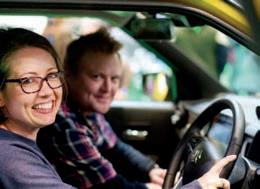
www.motabilityonebigday.co.uk
18 - 24 SEPTEMBER
Organ donation week
Nationwide
This awareness week is a great opportunity to discuss your wishes for the future with your loved ones. This is an important discussion to have but can be daunting, the week arms people with the information and tools they need to start an open and meaningful conversation about organ donation, as well as a chance to learn about your rights and the di erent laws throughout the UK.
www.organdonation.nhs.uk
11 - 12 OCTOBER
The Care Show

National Exhibition Centre, Birmingham
This year, the Care Show is focussed on celebrating you, to help you improve your care services. The industry event is for people and organisations working in the social care sector, providing an opportunity for them to discover products and services, network with colleagues from across the country, and a end a range of interesting CPD accredited seminars.
www.careshow.co.uk
16
SEP AND 27 OCT
Winchester Science Centre BSL Days
Winchester
Discover two floors of fun, interactive exhibits at Winchester Science Centre’s BSL days. Watch as science comes to life through shows and demos, or go on an indoor or outdoor nature adventure. A endees can fly through the stars in the Planetarium, as a BSL interpreter will be signing in both the Science Theatre and Planetarium on these dates.

www.winchestersciencecentre.org
29 SEPTEMBER Learn to Handcycle with Wheelpower
Cleavley Athletics Track, Manchester
This new event from WheelPower, the national charity for wheelchair sport, is run by experienced hand cyclists and qualified coaching sta , giving people with a physical disability the chance to come along and try the sport. Open to people over the age of 16, the event is suitable for both beginners and people keen to try hand cycling again, and you don’t need your own bike to a end.
www.wheelpower.org.uk
17 - 18 OCTOBER
Training: Understanding Stress and Anxiety in Autism
Online
This training course from the National Autistic Society is designed for anyone who works with autistic children or adults and already has an understanding of autism. Focussed on the e ect of stress and anxiety on autistic people, the interactive training course is CPD accredited and covers a range of content from terminology and definitions, to proactive strategies for support.
www.autism.org.uk
enablemagazine.co.uk 49
Send your upcoming events to editor@dcpublishing.co.uk enablemagazine.co.uk 49 enable life
KIDS
Sensory beanbags
This set of 12 textured sensory beanbags allow children to embrace tactile play, with each beanbag having its own emotion embroidered on to the front. The set of so beanbags are accompanied by emotion cards, helping to teach children and young people about their feelings in a di erent way, and aiding them in communicating their emotions.

£17.99, Inbeby www.amazon.co.uk
SENSORY Precious Petzzz Border Collie

This friendly pup has been created to help provide stress relief and reassurance to people living with Alzheimer’s and dementia, and comes sleeping in its own bed. The pet is ba ery operated and has breathing motions, and is the right size to sit in someone’s lap.
£29.99, Alzheimer’s Society 0333 366 0035 shop.alzheimers.org.uk
EDUCATION
Periodic Table of Elements UEB

This period table available through the RNIB shop is perfect for young people who use braille as they continue the school year. Produced in contracted Unified English Braille, the period table is set out in a 10-page bound pamphlet, and features all of the element’s chemical symbols, atomic numbers and atomic weights.
£2.50, RNIB 0303 123 9999 shop.rnib.org.uk
Product picks
HOME Google Nest Mini
This smart speaker might be small, but it can improve independence. The Google Nest Mini comes in a range colours and can help with a host of daily activities. Whether it’s keeping a schedule, se ing reminders to take medication, contacting friends, or catching up on the news, the built-in smart assistant is a great companion for anyone who has limited mobility or experiences isolation.

£49.00, Google store.google.com
SLEEP Huntington’s Optimum Bed
Designed with strength and safety in mind, the Kinderkey Huntington’s Optimum bed is specifically engineered to withstand the involuntary movements that are characteristic of Huntington’s disease. The bed’s sturdy construction and strong drop-down foam sides provide a secure and supportive environment that promotes safety and comfort.

POA, Kinderkey Healthcare ltd 01978 820 714 www.kinderkey.co.uk
HEALTH Pedal Exerciser with Digital Display
This Pedal Exerciser makes it easier to do low impact activities at home, with a digital display for monitoring progress, and adjustable resistance se ings. The device can be folded up into a compact size to store or transport, and can be used with the legs on the floor, or can be mounted on a desk to use with the arms.
£29.99, NRS Healthcare 03330 160 000 www.completecareshop.co.uk

Send us details of your products to editor@dcpublishing.co.uk enable life enablemagazine.co.uk 50 PICS: © AMAZON; PRECIOUS PETZZZ; RNIB; GOOGLE; NRS HEALTHCARE
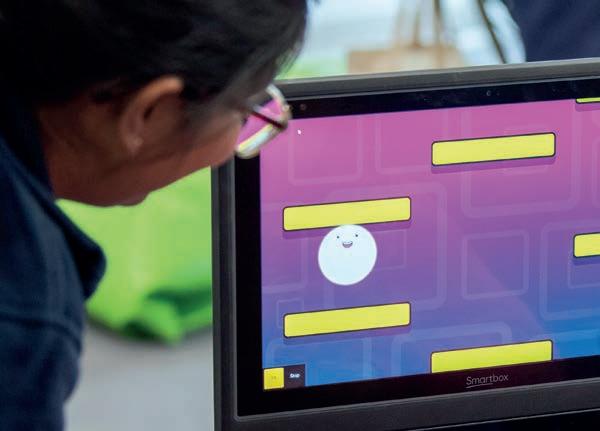



























thinksmartbox.com/LookLab Scan to try!
selection of fun and motivating
eye
technology.
A
activities that can be enjoyed by anyone who uses
gaze
“An affirming experience that prioritises celebration over pity, allowing disabled people to author their own stories and express the joy they find in being with others”
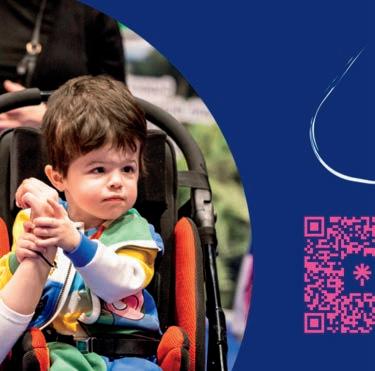



OUTTAKE MAGAZINE

“Quite simply one of the best first-person documentaries about disability ever”
THE CURB


IS THERE ANYBODY OUT THERE?

IN CINEMAS AND AT HOME FROM 17 NOVEMBER
www.conic.film/anybody
PENSIONS: Securing your future
Planning for the future is paramount, however, if having a disability or being an unpaid carer a ects your income, securing a stable pension might seem like an impossible task. Taking small steps to build your pension and utilising the support available can help you feel more secure as you get older
Regardless of your current circumstances, building a pension for your retirement is a ainable. This is thanks to the various schemes and initiatives to help people save for the future, even if their income is low or is reliant on benefits and other state support.
EMBRACE PENSION CREDITS
Pension credits are a valuable resource for people with low income or unpaid carers who may not be able to work due to their responsibilities. These credits provide financial support and supplement your income during retirement, making it easier to a ord day-to-day life. The financial support can also be obtained to help with housing costs like ground rent or service charges. By understanding your eligibility and applying for pension credits, you can bolster your pension pot and enhance your financial stability.
This scheme is separate from your state pension if you are eligible for one, and you can get pension credits even if you have other income, savings, or if you own your own home. The financial support could top up your weekly income to £201.05 if you are single, or £306.85 jointly if you have a partner. If your income is already higher than this, you may still be eligible due to a disability or if you care for someone.

CHOOSE THE RIGHT SCHEME
If you can a ord to pay in to a private pension outside of your state pension, explore the range of pension schemes
available in the UK. From personal pensions to workplace options, each scheme o ers its own advantages and suitability for di erent situations. A workplace pension sees your employer paying in as well as you, but you can opt-out of this if you would like to. Seeking advice from pension specialists who understand the unique challenges faced by disabled people and unpaid carers will help you to select the most appropriate scheme for your unique needs.
SEEK EXPERT ADVICE
Financial planning can be overwhelming, but you don’t have to face it alone. Speaking to a finance organisation or a financial advisor can assist you in creating a long-term plan. Numerous organisations and resources are dedicated to providing free financial advice and support for disabled people and carers.
Through Citizens Advice, you can access free, confidential advice on money ma ers, benefits, and pensions to make informed decisions about your financial future.
Disability Rights UK have a number of resources and guidance tailored to promote the rights and financial wellbeing of disabled people, and similarly, Age UK o ers support and advice. Securing your pension is an investment in yourself and your future. By utilising pension credits, exploring suitable pension schemes, and accessing available support, you can build a robust financial foundation for years to come.
53 enablemagazine.co.uk
enable finance FOR MORE INFORMATION Access support and advice on pensions and finances from Citizens Advice (www.citizensadvice.org.uk, 0800 144 8848), Disability Rights UK (www.disabilityrightsuk.org), or Age UK (www.ageuk.org.uk, 0800 678 1602) You can access free, confidential advice on money matters
MAZDA CX-60 SUV
Alisdair Su ie test drives this new Mazda as it takes on Audi and BMW with its CX-60 SUV. It has the class and talent to compete, but at a price

INSIDE
As the CX-60 is larger in every direction than the Mazda CX-5, you find yourself stepping into it rather than si ing down when you open the door. It makes the CX-60 very comfortable and the front seats o er plenty of support on longer trips. Leather upholstery as standard adds to the upmarket feel, as does the digital dash display and large 12.3inch infotainment screen. This is a real Mazda strength as it’s very simple to operate via the rotary control just behind the stubby gear selector. The simple menus further help here and we’re very pleased Mazda has stuck with
proper bu ons for the ventilation. The driver’s vision is unhindered to the front and sides, but the narrow rear screen limits the rear view. However, standard parking sensors and reversing camera on all models counter this. Space in the rear is more than su cient for two adults or three kids.
Open the boot and there’s 570-litres of room, which is more than an Audi Q5 or BMW X3 can muster. Other than the high load sill common to all SUVs, the boot is more than able to hold a wheelchair and other luggage, and you can fold the 40-20-40 split rear seat for extra storage capacity.


54 enablemagazine.co.uk
REVIEW
The
EQUIPMENT
Mazda o ers three trims for the CX-60, starting with the Exclusive that has 18-inch alloy wheels, all-round parking sensors and reversing camera, and powered tailgate. Inside, it has leather upholstery, 12.3inch infotainment display with rotary control, heated front seats and steering wheel, climate and cruise controls, and a head-up display. There’s also a host of safety kit that you’d expect in this sector. The Exclusive has everything you need, but you can upgrade with the Homura that adds 20-inch alloys, hands-free tailgate opening, and gloss black exterior trim. On the inside, the Homura has ambient lighting, electric seat adjustment, heated rear seats, and an uprated stereo. Move to the Takumi and you enjoy a panoramic glass sunroof, white maple wood trim, and white Nappa leather upholstery.
DRIVING
The only Mazda CX-60 o ered through Motability is the 2.5-litre PHEV plug-in hybrid, not the 3.3-litre turbodiesel. That’s no hardship when the petrol is very quick o the mark and there’s an electric-only driving range of up to 39 miles. Charging up the CX-60 2.5 e-Skyactiv is just as simple as with any electric car, so it o ers a great combination of zero emissions driving in town and realworld range with the petrol motor. The only small downside with this model is the ride is a li le sti er than the diesel version. However, it’s no

PIP Advance Payment of £5995. Find out more at www.motability.co.uk
firmer than a BMW X3’s or Volvo XC60’s, and the Mazda is one of the most enjoyable in this class to drive on country roads. On the motorway, it’s hushed and around town it feels surprisingly nimble for a big SUV.

SUMMARY
If you can afford a minimum Advance Payment of £5995, the Mazda CX60 is a refined, plush, and frugal large SUV.

55 enablemagazine.co.uk
enable motoring
front seats o er plenty of support on longer trips

Celebrating sport
Throughout the rest of 2023 and as we look towards 2024, an exciting calendar of para sport is here to inspire you to get active and start moving more

In the world of sport, barriers are meant to be broken and this is especially true in the realm of disability sports, redefining the boundaries of what is possible with adapted clubs and inclusive sports constantly evolving. Throughout this year and as we look towards 2024, there is an exciting range of upcoming disability sport and para sport events in the UK and beyond.
Paris 2024 Summer Paralympic Games
www.paris2024.org
As the dust se les from the success of Team GB at the Tokyo 2020 Paralympic Games, the stage is now set for another momentous event. The Paris 2024 Summer Paralympic Games, scheduled to take place from 25 August to 6 September next year, promises to be an inclusive celebration of sport. From athletics and swimming to wheelchair basketball and para-cycling, this global event will showcase the best athletes, competing on the world’s grandest stage. Sports enthusiasts can tune in on TV or visit the o cial Paralympic Games website to watch the action live when the time comes.
Invictus Games 2023 invictusgames23.de
Created by His Royal Highness, the Duke of Sussex, the Invictus Games have become a symbol of triumph over adversity for wounded, injured and sick servicemen and women. This prestigious multi-sport event, taking place in Dusseldorf from 9 to 16 September this year, will feature athletes from across the globe, all who have served in the Armed Forces. With events ranging from adaptive rowing to si ing volleyball, the Invictus Games will not only highlight the remarkable sporting achievements of para athletes, but also underline the power that sport can play in aiding people’s recovery and rehabilitation journeys.
International Wheelchair Rugby Cup
www.worldwheelchair.rugby
The International Wheelchair Rugby Cup is an unmissable event for sports enthusiasts, where GB’s wheelchair rugby team will take on competitors from across the world. This year’s tournament will be held in Paris, France helping viewers to get excited ahead of the 2024 Paralympic Games.
STAYING CONNECTED
There’s always national, local and international events taking place in para-sport. To stay updated with all the latest news, schedules, and results of these events and more, visit the
o cial websites of governing bodies like the International Paralympic Commi ee (www.paralympic.org) and the British Paralympic Association (www.paralympics.org.uk). You can also connect with other people in the sporting community on social media, or follow your favourite athletes.
From the grand stages of the Paralympics to the camaraderie of events like the Invictus Games, each upcoming para-sport event promises an exciting time for accessible sport.
FOR MORE INFORMATION
To connect with clubs in your local area, visit the Every Body Moves website (www.everybodymoves.org.uk)
57 enablemagazine.co.uk
enable
active











JOINING THE WORLD OF WORK
Entering the workplace from education can be a big transition, but a supported employment programme or an apprenticeship could help you ease into the world of work in a way that suits your needs and how you like to learn

Increased independence, confidence and a host of new skills all go hand in hand with starting your career, alongside practical factors like earning a wage. Apprenticeships and supported employment programmes o er a structured, progressive path into the world of work. The right fit for you will depend on factors like what career you want to pursue, your current skillset, and how much support you might need. Through both of these paths, you are entitled to reasonable adjustments in the workplace.
SUPPORTED EMPLOYMENT
Supported employment programmes and supported internships are a great way to enter the workplace whilst maintaining structure and utilising tailored support. These schemes are for young people, and some organisations provide opportunities specifically for young disabled people. This gives people the chance to work with a local or national employer to gain skills through on-the-job training, but it can also lead to qualifications that will help you launch your career. Usually geared towards 16 to 24-yearolds, the study programmes are o en provided by further education colleges or disabled people’s organisations, and can be a great fit for people with a learning disability who might need additional support and guidance as they enter the workplace. Healthcare, retail and hospitality are all popular options, but other industries also o er these. The option of a supported internship or employment programme can bridge the gap between education and full-time employment.
APPRENTICESHIPS
An apprenticeship is a great way to launch your career, or to find a new passion if you are looking for a change where you can earn and learn at the same time.
An apprenticeship combines practical and academic learning, and you will get paid for doing so, although at a lower rate than some other roles. Alongside having a position in the workplace, you’ll get the chance to spend some of your time studying at university, college or at home in order to gain a qualification. This educational aspect will be funded by another party like the employer. This could see you gain the skills and knowledge you need for your chosen career, and can cut out years of time in education for a similar result.
Across the UK, there are more than 600 apprenticeships to choose from in a range of industries from technology to engineering and design. With so many to pick from, there’s something to meet everyone’s interests. Depending on where you live in the UK, there are di erent categories of apprenticeship: in Scotland these go from foundation to modern then graduate, whereas in England these are intermediate, advanced, higher and degree. The range of levels means that there is a chance for everyone to explore an apprenticeship, regardless of your previous experiences and level of education.
FOR MORE INFORMATION
Disabled people’s organisations including Mencap (www.mencap.org.uk) and Scope (www.scope.org.uk) can help give advice on supported internships. You can research apprenticeships in your area through organisations like UCAS (www.ucas.com), the UK Government’s Apprenticeships site (www.apprenticeships.gov.uk), and the Sco ish equivalent (www.apprenticeships.scot)
59 enablemagazine.co.uk
enable employment
There are more than 600 apprenticeships to choose from in a range of industries
We’ve been named as a disability confident employer by Jobcentre Plus and have a positive attitude towards job applications from disabled people.

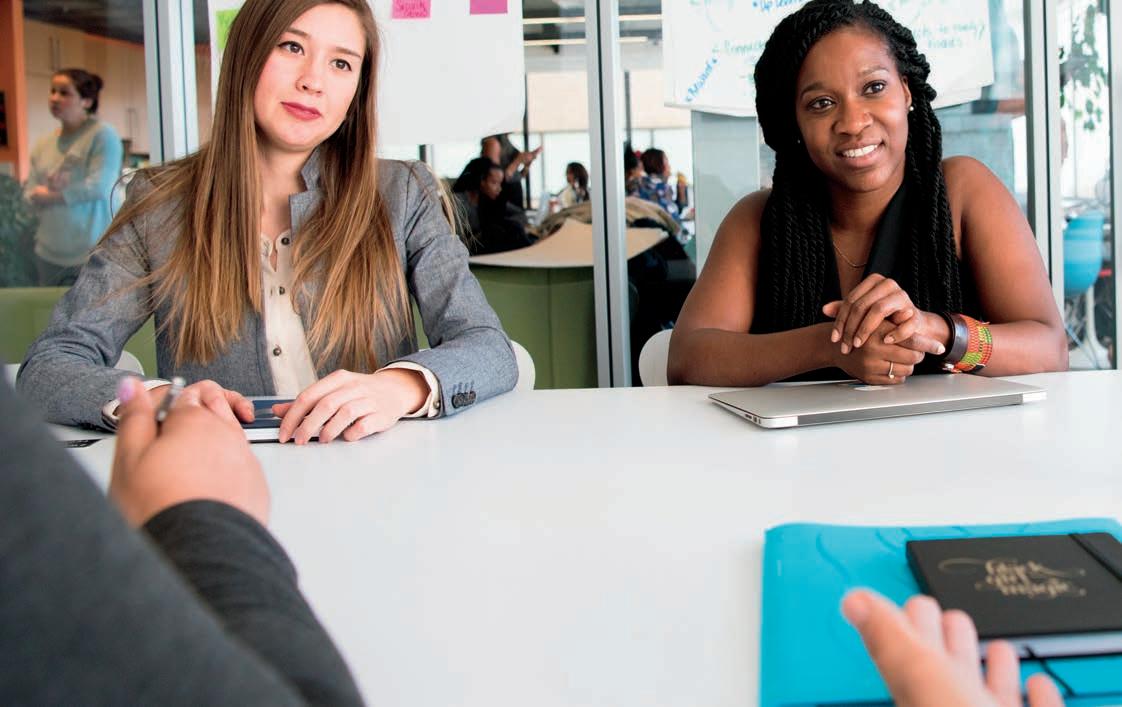
As we progress, we’ll continue to improve the way that we support our staff, customers, and stakeholders, regardless of disability, gender, ethnicity, age, religion, or sexual orientation.

Support to work in the way that’s right for you Flexible working patterns, di erent o ce locations, working from home Work that makes a di erence 3 ONE TO WATCH www.audit-scotland.gov.uk/careers
Equality, Diversity, and Inclusion strategy is a priority at RoS. It’s not a one off or an event, it is an ongoing process, and we will work
colleagues to feel safe, supported and included at work.
Our
for our
equality at our core.
We want to be an employer of choice, attracting and retaining the best and widest possible pool of talent. We’ve
CollaboratingforEquity,DiversityandInclusion Makingyourplaces,spaces,policiesandpracticesaccessibleandinclusive Auditing Coaching Consultancy email:info@embed.org.uk www.embed.org.uk
Inclusion starts with listening
Anna Pinsky, leadership and manager development lead at Registers of Scotland, explains how she has been supported to bring her very best to the organisation
Anna joined Registers of Scotland (RoS) – the public body responsible for public registers of land, property and other legal documents in Scotland - in October 2022. In her role, she is responsible for supporting the professional development of managers and leaders, and for succession planning.
“I have partial facial paralysis on the right side of my face and partial deafness in my right ear. There are many causes of facial paralysis. In my case, I developed it and my partial deafness at age 20 due to surgery. I have also developed synkinesis which
means that I experience linked or unwanted facial movements on the right side of my face.
Most people can blink, smile, talk or eat without thinking. However, I need to think about it and make these facial movements deliberately.
I have limited movement on one side of my face, so the few muscles I can move, must work harder and tire more quickly. Due to the partial hearing loss, I also need to concentrate much more when in environments with lots of background noise.
When I developed facial paralysis, there was no organisation to support me, I had to develop my own
strategies. I re-learned how to move my face and manage my energy so I could study and work to the same level as others.
Since joining RoS, I find hybrid, flexible working really helps me. In my role, I lead full-day workshops, talking and presenting for long periods of time. This tires the muscles of my face, but I can plan for it.
I can balance longer and shorter days, and also balance these tasks with others that are less interactive. This lets me manage my energy so I can bring my full effort and focus across all the tasks that my role involves.
Another benefit of flexible working is that it has enabled me to support others living with facial paralysis by taking up a volunteer trustee role at Facial Palsy UK (www.facialpalsy.org.uk).
From day one at RoS, I had inperson support to help navigate our modern, comfortable office facilities. One-to-one support enabled me to set up and use the high-quality IT kit that supports hybrid work. So, I can bring my best whether at home or the office.
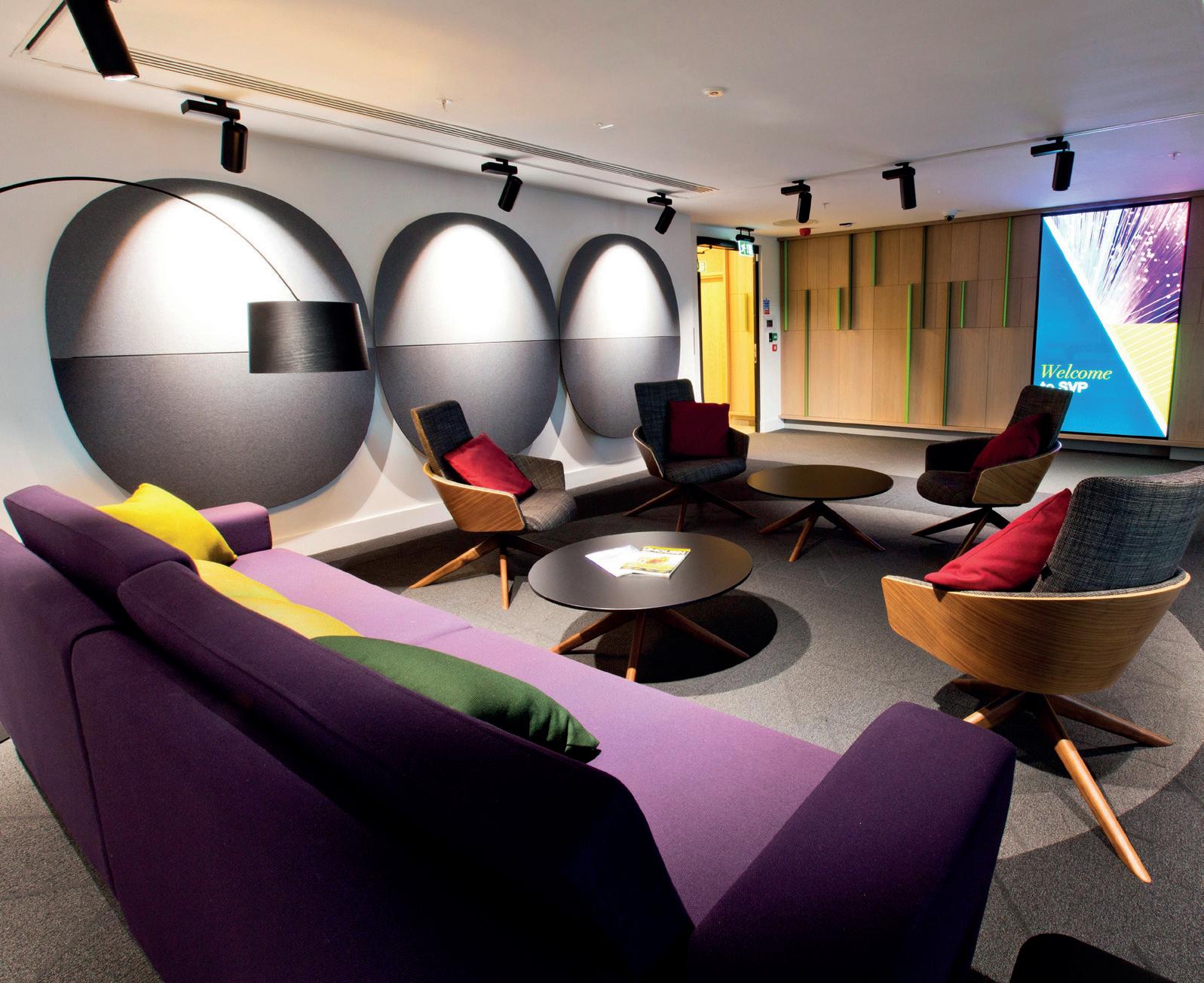
We also have resources to support us. Our Employee Passport makes it easier to have conversations with managers, explore adjustments and get the support we need.
I would strongly recommend RoS as an employer for the support it provides to people living with visible or non-visible disabilities.”
61 enablemagazine.co.uk
enable employment
FOR MORE INFORMATION Find out about inclusive career opportunities with Registers of Scotland at www.ros.gov.uk
Registers of Scotland’s modern, accessible office space in Glasgow
Jane Hatton

Jane is the founder of Evenbreak, a social enterprise run by and for disabled people, with a specialist job board and a career hive.
Send your questions to editor@dcpublishing.co.uk
TACKLING JOB INTERVIEWS
AThe first thing to do is to ask the recruiter if you can have the questions in advance of the interview, as a reasonable adjustment. Then you shouldn’t be confronted with an unexpected question. Good employers will offer this as standard, but many won’t, so here are some strategies you can use.

Preparation is key to performing well in an interview. Keep a notebook with lots of examples to take with you, go over your CV and the job description again, and practice mock interviews with friends and family.
If you are confronted with a di cult question, buy a li le time by acknowledging their question and paraphrasing it back to them to ensure you’re on the right track. Then take a moment, sip the water and compile an answer which provides proof in the form of an example or two.
If you don’t understand the question then it’s best to ask them to clarify. By making sure you understand the question before answering, you will
get ahead of others who take a stab in the dark and miss the point. By working with them to clarify, you are demonstrating that you can be collaborative and communicate well in a team.
If it is a scenario-based question, for example: “What would you do if a customer was rude towards one of your colleagues?”, then the employer probably doesn’t just want to hear your answer, but the journey you took to come to that answer. Don’t be afraid to think out loud as you explain what factors you would consider, as well as what you would do and why. These questions o en look at our problemsolving abilities and those skills are about the process as well as the outcome.
Good luck at your next interview, and I hope this helps.
62 enablemagazine.co.uk
QI’m quite good at ge ing to interview stage when applying for jobs, but I’m just no good at interviews. I prepare well, but as soon as I am asked a question I wasn’t expecting, I go to pieces and can’t think straight. I’ve lost so many opportunities because of this.
enable employment
Don’t be afraid to think out loud as you explain what factors you would consider
Visit the Evenbreak website to access candidate resources free of charge: www.evenbreak.co.uk hive.evenbreak.co.uk
EMPLOYMENT Q&A
In her column Jane Ha on, founder of Evenbreak, answers your employment questions
Studying National Qualifications this year?
If you are studying a National 1 – National 5, Higher or Advanced Higher course and need additional support because of a disability or additional support need, speak to your teacher or lecturer about assessment arrangements.
Assessment arrangements are adjustments that can be made to enable learners who are disabled and/ or those with additional support needs to access an assessment and demonstrate the relevant knowledge, skills and understanding of the course.
sqa.org.uk/assessmentarrangements
NAVIGATING
HIGHER EDUCATION
Embarking on your journey in higher education is an exciting and transformative experience, but it can also be accompanied by challenges, especially for young disabled people. The transition from secondary education to university or college life is a significant step, requiring careful consideration and planning to ensure a smooth and successful transition. That’s why we’re o ering insights for new students that have just made the move to higher education, covering essential aspects like se ling in, making friends, seeking reasonable adjustments, accessing tailored support, addressing issues, and obtaining financial assistance for specialised equipment.
SETTLING IN
Moving to a new environment can be daunting, but universities and colleges o en o er dedicated support systems to help students integrate seamlessly. Se ling in events, freshers’ programmes, and disability-focussed welcome sessions are common practices in many institutions. These initiatives provide an opportunity to meet fellow students, learn about campus resources, and get acquainted with the disability support team.
Forming social connections is essential for a fulfilling university experience. Engaging in clubs, societies and extracurricular activities can help foster friendships and create a sense of belonging – you could even discover a new hobby in the process. Many institutions
have disability-specific societies that provide a platform for connecting with peers who share similar experiences and want to get involved with activism in the university or in the local community.
ADJUSTMENTS AND SUPPORT
Universities are legally obliged to provide reasonable adjustments to ensure that students with disabilities have equal access to education. These adjustments could include extended exam time, accessible lecture materials, or assistive technology. Now that you have started your course, it’s crucial to communicate your needs clearly if you haven’t already. You might have disclosed your disability through the UCAS application, providing institutions with the information they need to prepare appropriate support, but it’s never too late to reach out to the disability support team yourself.
As a new student, connecting with the institution’s disability support team is crucial. These teams are equipped to assess your needs and collaborate with academic sta to implement necessary adjustments. Prospects advises students to get in touch with the team before their course starts to discuss specific requirements and ensure everything is in place from day one, but you can do this at any time throughout the year if your needs change.
ADDRESSING ISSUES
Despite the best e orts of these teams, course leaders and lecturers, challenges may arise during your time in higher education. If you encounter
any issues, the first step is to reach out to the disability support team or an academic advisor if you have one. Documenting your concerns and maintaining open communication is key. If your concerns are not adequately addressed, you can escalate the ma er through formal university channels, but you normally don’t have to get to this stage to resolve what has happened.
In cases where reasonable adjustments are not provided, or if you experience discrimination, your rights are protected by the Equality Act 2010. This legislation ensures that universities cannot discriminate against disabled students and must make the necessary adjustments to accommodate their needs.

64 enablemagazine.co.uk
The first step is to reach out to the disability support team
If you have just started a higher education course, it isn’t too late to access essential support to ensure you can achieve the best outcome possible
FINANCIAL SUPPORT
The financial aspect of university life is a significant consideration for all students, but studying with a disability can come with additional costs, some that you might not have considered until you start your new schedule and figure out what you really need. Fortunately, several avenues of financial support are available. The Disabled Students’ Allowance (DSA) is a resource provided by the UK Government to help cover the costs of additional support and equipment that disabled students might need. This could include assistive technology, specialised so ware, or personal care assistance.
To apply for DSA, you can start the process through the government’s o cial website (www.gov.uk). The
application involves providing evidence of your disability and engaging in a needs assessment. The assessment determines the level of support you’re eligible for and tailors it to your specific requirements. There is o en a wait list for assessments, so apply as soon as you can if you need this funding.
Many universities and organisations o er scholarships, grants, and bursaries specifically designed for disabled students. These financial resources can alleviate the burden associated with higher education and help you access the tools you need to succeed. Sites like Turn2Us (www. turn2us.org.uk) can help you find this specific funding and view eligibility criteria.
Starting university is a significant step toward personal growth: it’s a

great way to build independence while you learn. While challenges may arise, the higher education system is wellequipped to provide comprehensive support for disabled students. Se ling in, making friends, seeking reasonable adjustments, accessing tailored support and obtaining financial assistance are all crucial steps to ensure a successful academic journey. By taking advantage of the resources and support networks available, you can embark on higher education with confidence and enthusiasm.
FOR MORE INFORMATION
To learn more about the support available, speak to your university’s disability support team or visit the Prospects website (www.prospects.ac.uk).
65 enablemagazine.co.uk
enable education
PROGRESSING
DISABILITY INCLUSION
Diversity and inclusion are integral to business success, and the Valuable 500 is central to advocating for positive change in some of the world’s biggest businesses. During July 2023, Katy Talikowska stepped into the role of chief executive at the organisation, adding to her impressive CV and bringing a fresh perspective.
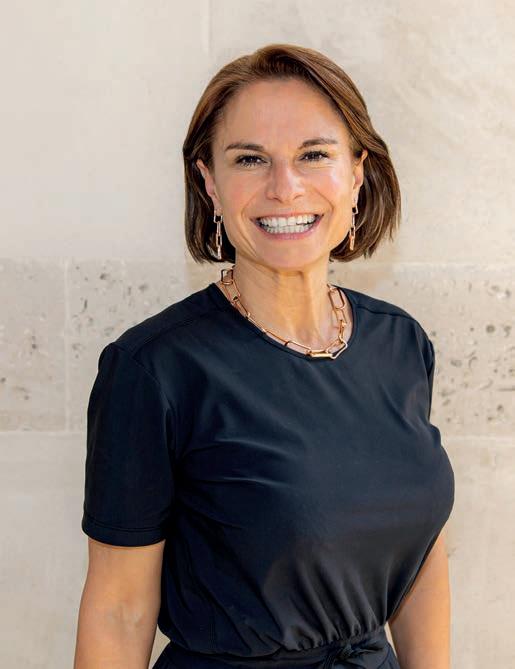
ALIGN

The Valuable 500, a pioneering initiative founded by Caroline Casey, is a coalition of 500 prominent companies dedicated to eradicating disability exclusion from corporate environments. Members include giants like Apple, Microso , Google and PayPal. Katy’s credentials align with the organisation’s key mission, and make her a great fit to join the team.
“I’ve always been an avid ally and an active follower and supporter of what the Valuable 500 were doing so when Caroline explained that she was embarking on this very rigorous and stringent search, I knew I had to throw my hat in the ring,” explains Katy.
With a history in advertising and marketing, Katy spent over three decades working with global brands, including leading confectionery brand Mars. In 2016, a pivotal moment in Katy’s career arrived when she found herself at the helm of the groundbreaking Maltesers ‘Look on the Light Side’ campaign. This campaign defied conventional norms in advertising at the time, making waves with the public by utilising authentic stories
from the disability community to change perceptions. It went on to become Maltesers’ most successful campaign in 18 years, reinforcing the notion that inclusivity is not only a moral obligation, but a sound business strategy.
In her new role, Katy’s vision for the Valuable 500 is to harness the power of collective action to break down the barriers that perpetuate disability exclusion, but her relationship with the organisation started years ago. In 2019 Katy was involved in launching the Valuable 500, and began to build a professional and personal relationship with Caroline Casey.
PROGRESS

Katy has always pushed for be er representation, but her entry into the disability advocacy space wasn’t solely driven by professional pursuits: her personal experiences of having family members with disabilities gave her a deeper understanding of the importance of inclusion.
“I think it is critical that we all work together and see people as human beings, it’s just the right thing to do,” o ers Katy. “Businesses and brands have started having these conversations and making changes, but we have a lot more to learn.”
She highlights that disability inclusion isn’t just an initiative that has to be fulfilled, it’s something that should be ingrained in every corner of society.
Katy’s background in advertising has given her a unique perspective
on storytelling and communication, which she plans to leverage to engage partners and create lasting change. Under Katy and Caroline’s leadership, the Valuable 500 is working towards the first ever accountability summit, due to be held in Tokyo in 2025. In the lead up, the organisation will focus on three core actions: nurturing leadership, enhancing reporting, and promoting inclusive representation throughout business processes. Katy’s experience measuring tangible results to influence change will be essential to this progress, helping to change narratives and champion disability inclusion in business.
“Imagine what we can achieve if we all collectively address the same problem at the same time, I’m so hopeful that we can achieve real progress and real system change,” concludes Katy.
FOR MORE INFORMATION
Find out more about the Valuable 500’s work and the lead up to the first ever accountability summit at www.thevaluable500.com
66 enablemagazine.co.uk
enable employment
As the Valuable 500 work towards their landmark accountability summit in 2025, the global partnership’s new chief executive discusses how her experience and the team’s e orts are pushing to progress inclusion in business
I’m so hopeful that we can achieve real progress and real system change
Katy Talikowska
